Transforming a small attic with a low ceiling from a cramped, forgotten space into a functional and cozy retreat is a rewarding challenge. The key lies in embracing the unique architectural constraints, such as slanted walls and limited height, and turning them into design assets. With clever planning, the right color palettes, and smart furniture choices, these character-filled rooms can become anything from a serene bedroom to a productive home office. By maximizing natural light, incorporating strategic storage, and selecting low-profile furnishings, even the most challenging attic can become one of the most beloved rooms in the house, offering a perfect sanctuary.
1. Under-Eaves Built-In Bed Nook
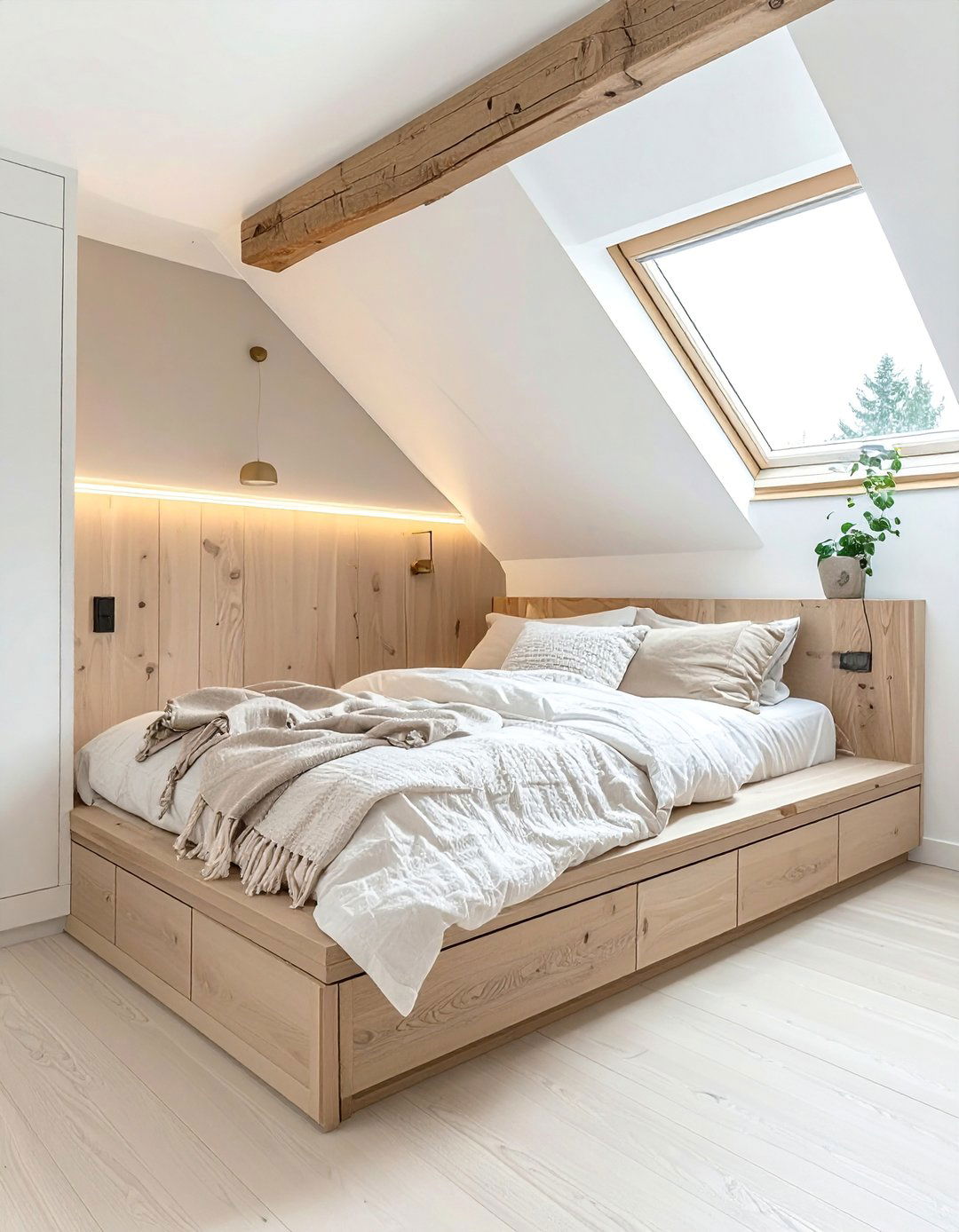
A fantastic way to utilize the lowest part of a small attic is by creating an under-eaves built-in bed nook. This design cleverly tucks the bed against the sloped ceiling, transforming a typically awkward area into the room's cozy focal point. By building the bed frame directly into the structure, you maximize every inch of floor space. Consider incorporating drawers underneath the platform for hidden storage, perfect for bedding or clothes. Painting the nook a soft, light color can make it feel like a comforting cocoon, while adding a wall-mounted reading light completes the functional and snug setup, making it an ideal sleeping quarter.
2. Low-Profile Platform Bed Centering
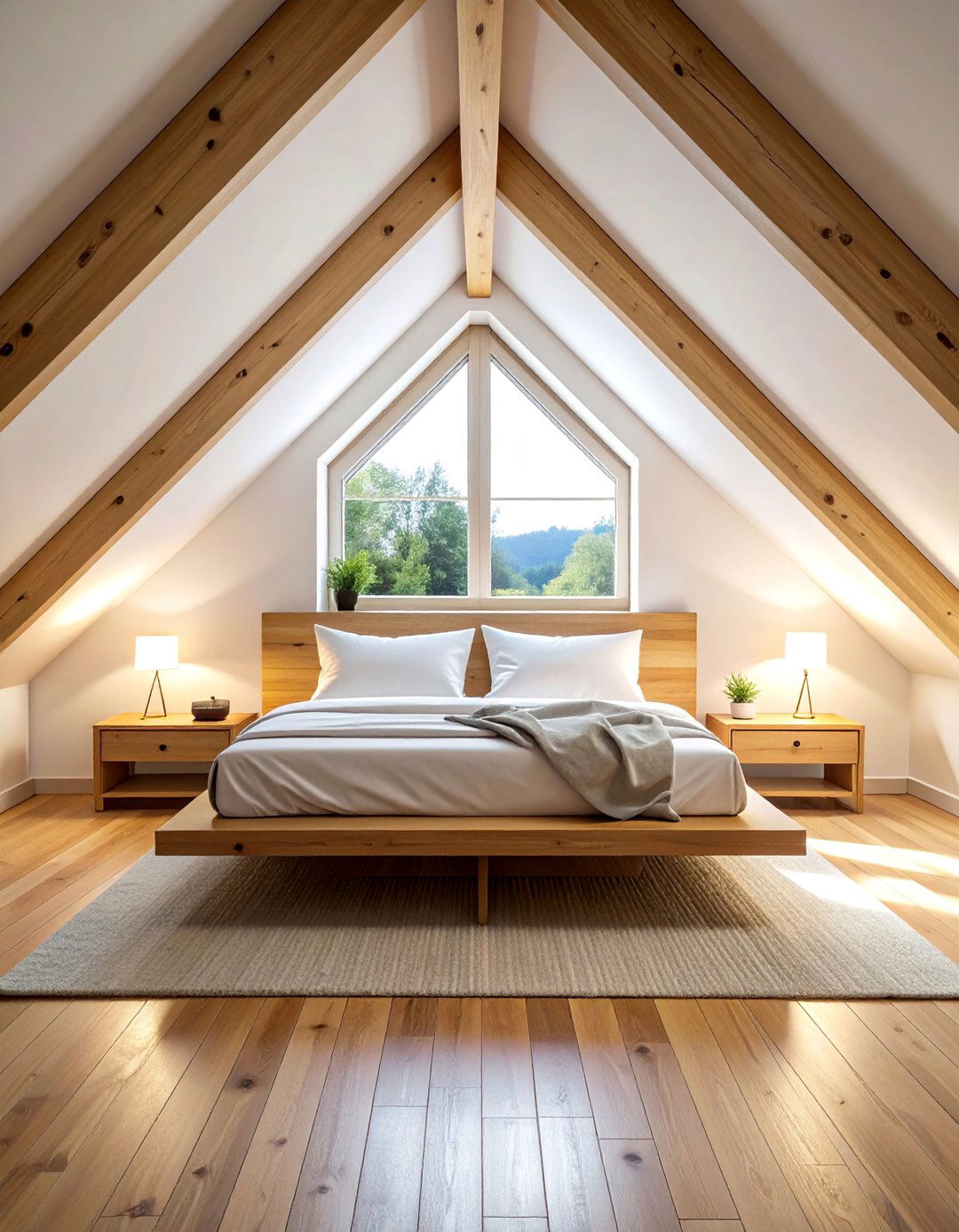
For a small attic room with a central peak, positioning a low-profile platform bed directly under the highest point can create a sense of symmetry and openness. This approach draws the eye upward, making the ceiling feel higher than it is. Low-profile beds sit closer to the ground, which naturally creates more vertical space and prevents the room from feeling cramped. Flanking the bed with matching low nightstands and simple table lamps can enhance the balanced aesthetic. Using a light-colored duvet and minimal pillows keeps the focus on the room's airy quality, turning the bed into a serene centerpiece rather than a bulky obstruction.
3. Wall-to-Wall Light-Colored Carpeting
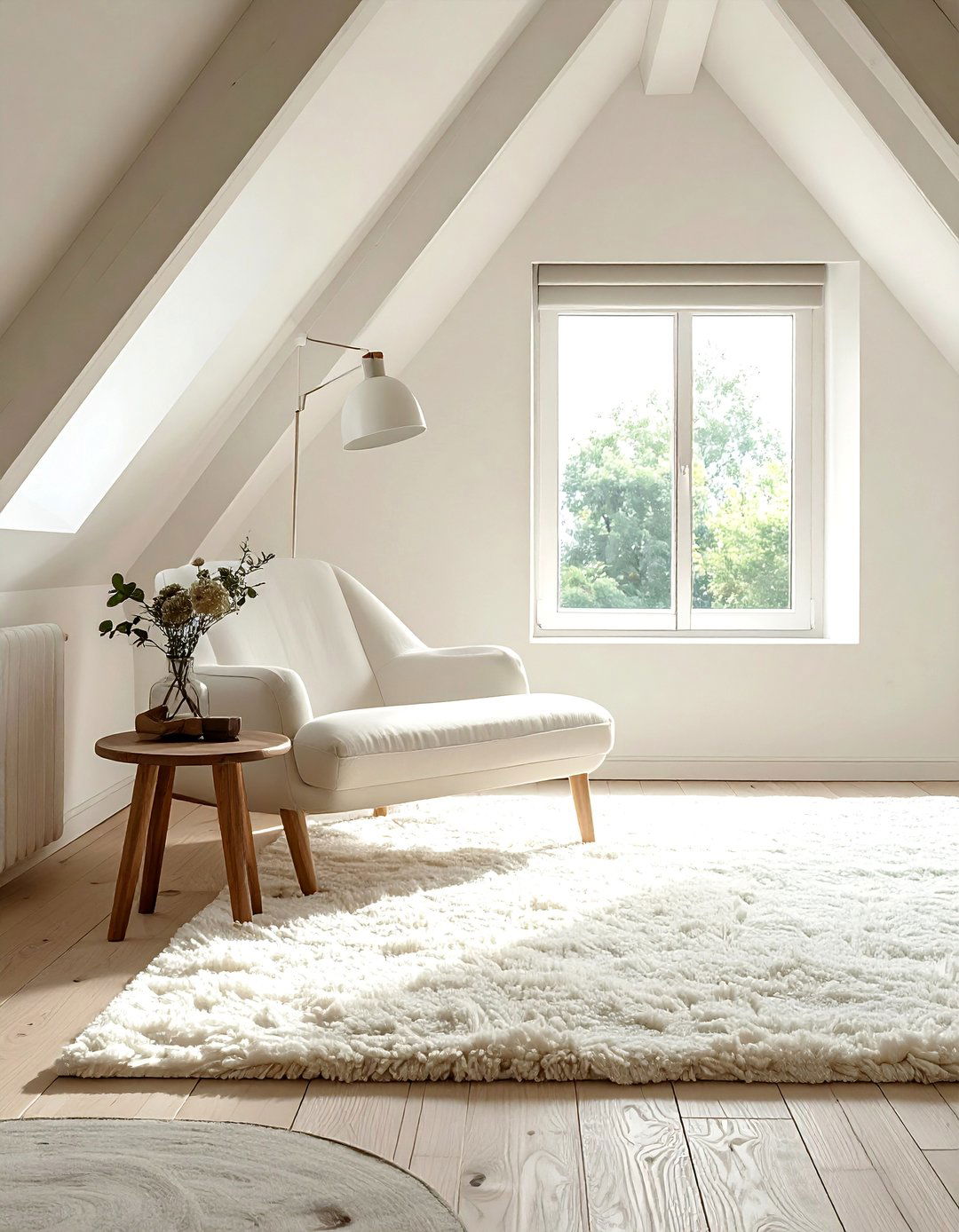
Installing wall-to-wall light-colored carpeting is a strategic move in a low-ceiling small attic room. A seamless floor covering in a shade like cream, light gray, or beige visually expands the space by creating an uninterrupted plane. This tricks the eye into perceiving the room as larger and more cohesive. Soft carpeting also adds a significant layer of coziness and warmth, making the attic an inviting retreat. It helps with sound insulation, an added benefit for a bedroom or quiet office space. Paired with light-colored walls, the effect is a bright, airy environment that feels comfortable and spacious despite the limited ceiling height.
4. Maximizing Light with Large Skylights
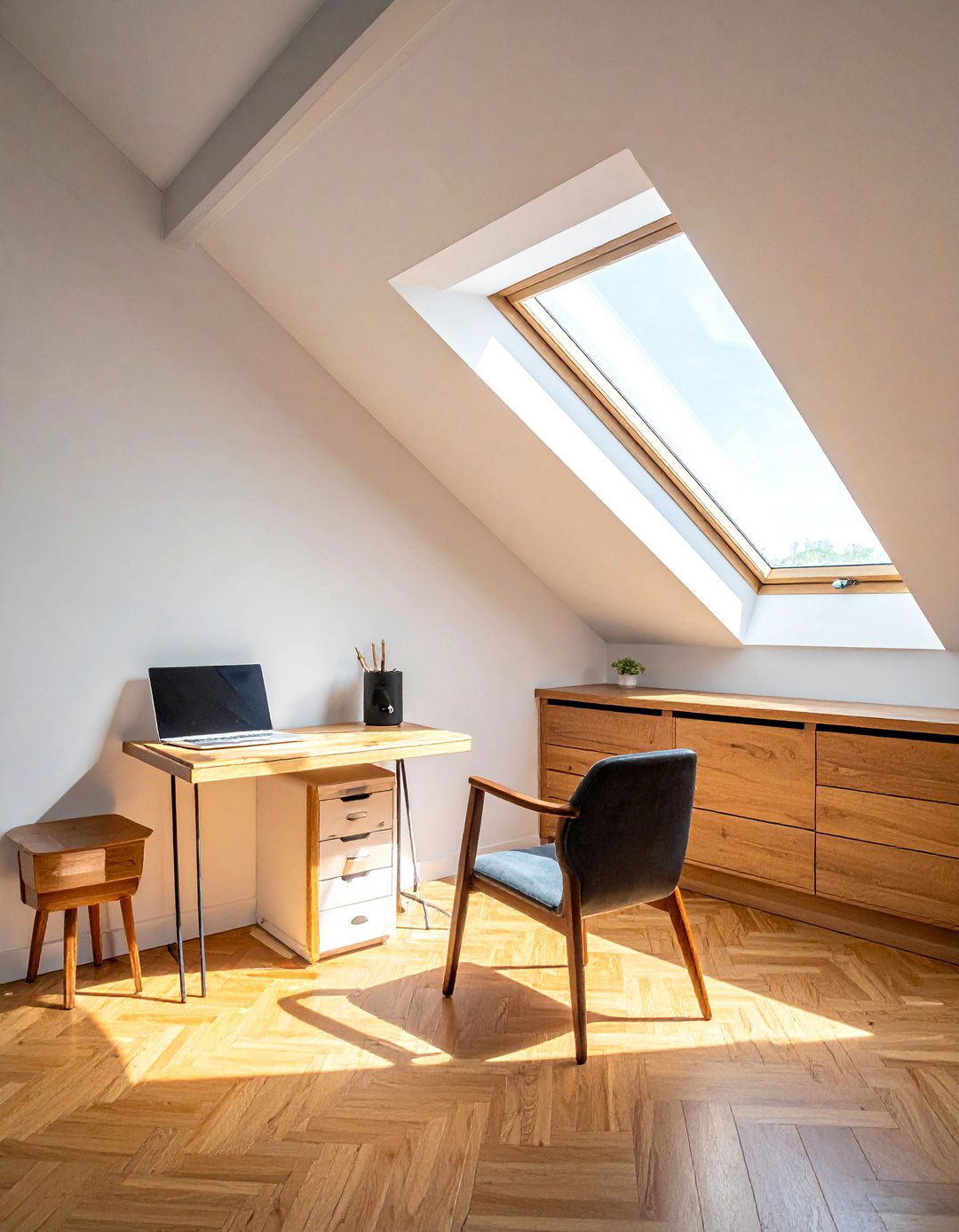
One of the most effective ways to combat the enclosed feeling of a low-ceiling attic is by installing large skylights. These windows in the roof flood the space with natural light, instantly making it feel brighter, larger, and more open. Positioning a skylight directly above a desk or a seating area can create a beautiful, sun-drenched spot for work or relaxation. The view of the sky also adds a dynamic element to the room, connecting the indoor space with the outdoors. For privacy and light control, consider adding fitted blinds that can be easily adjusted as needed, ensuring the room remains functional throughout the day.
5. Horizontal Wall Paneling or Stripes
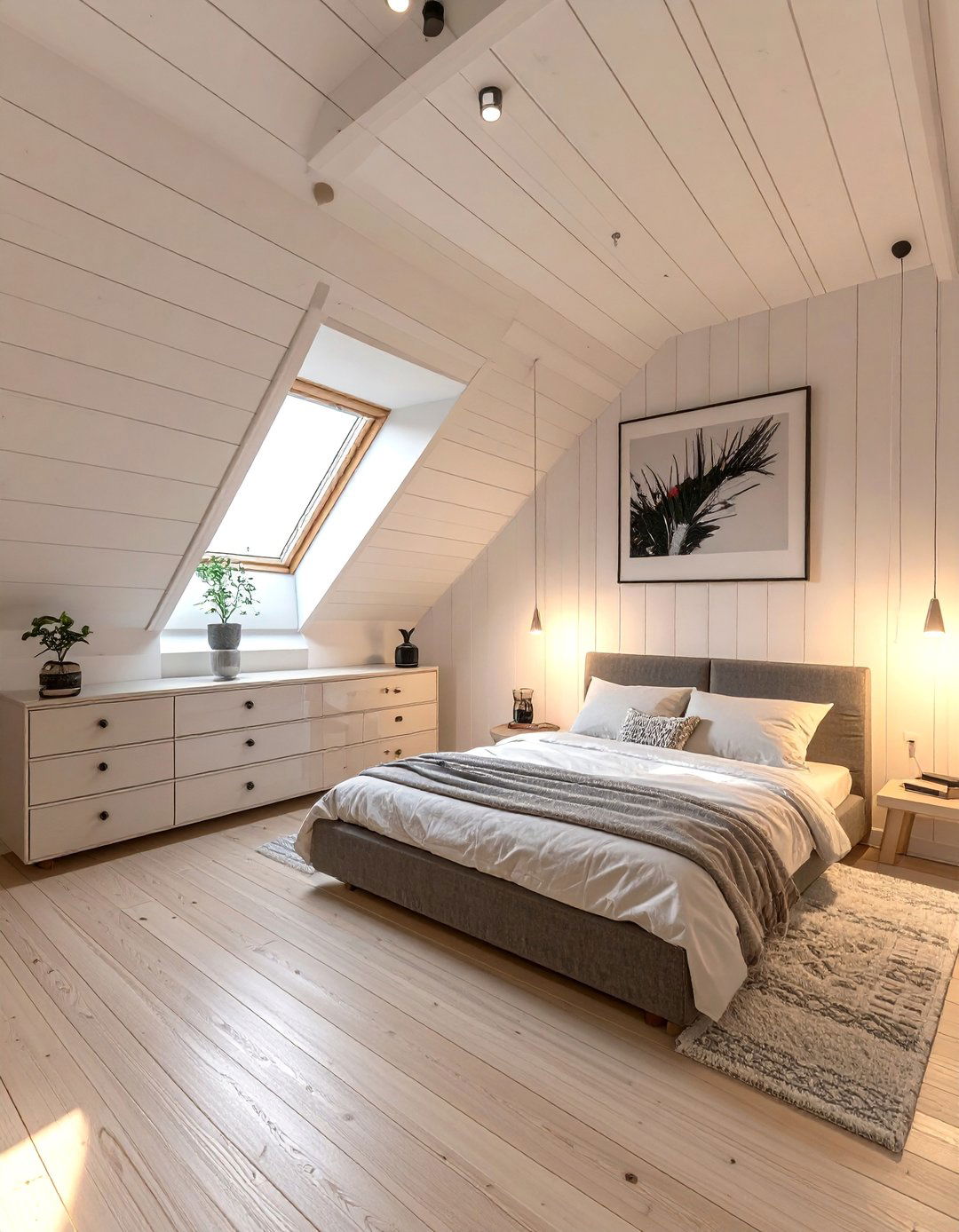
To counteract the vertical limitations of a low ceiling, consider using horizontal wall paneling or painting horizontal stripes. This design technique creates a powerful optical illusion, making the walls appear wider and the room feel more expansive. For a subtle effect, use shiplap or beadboard painted in a light, neutral tone like white or soft pastels. Alternatively, painting wide, low-contrast stripes can achieve a similar result without adding texture. This approach guides the eye around the room rather than up towards the low ceiling, effectively stretching the space visually and adding a touch of charming architectural detail.
6. Integrated Low Bookshelves and Storage
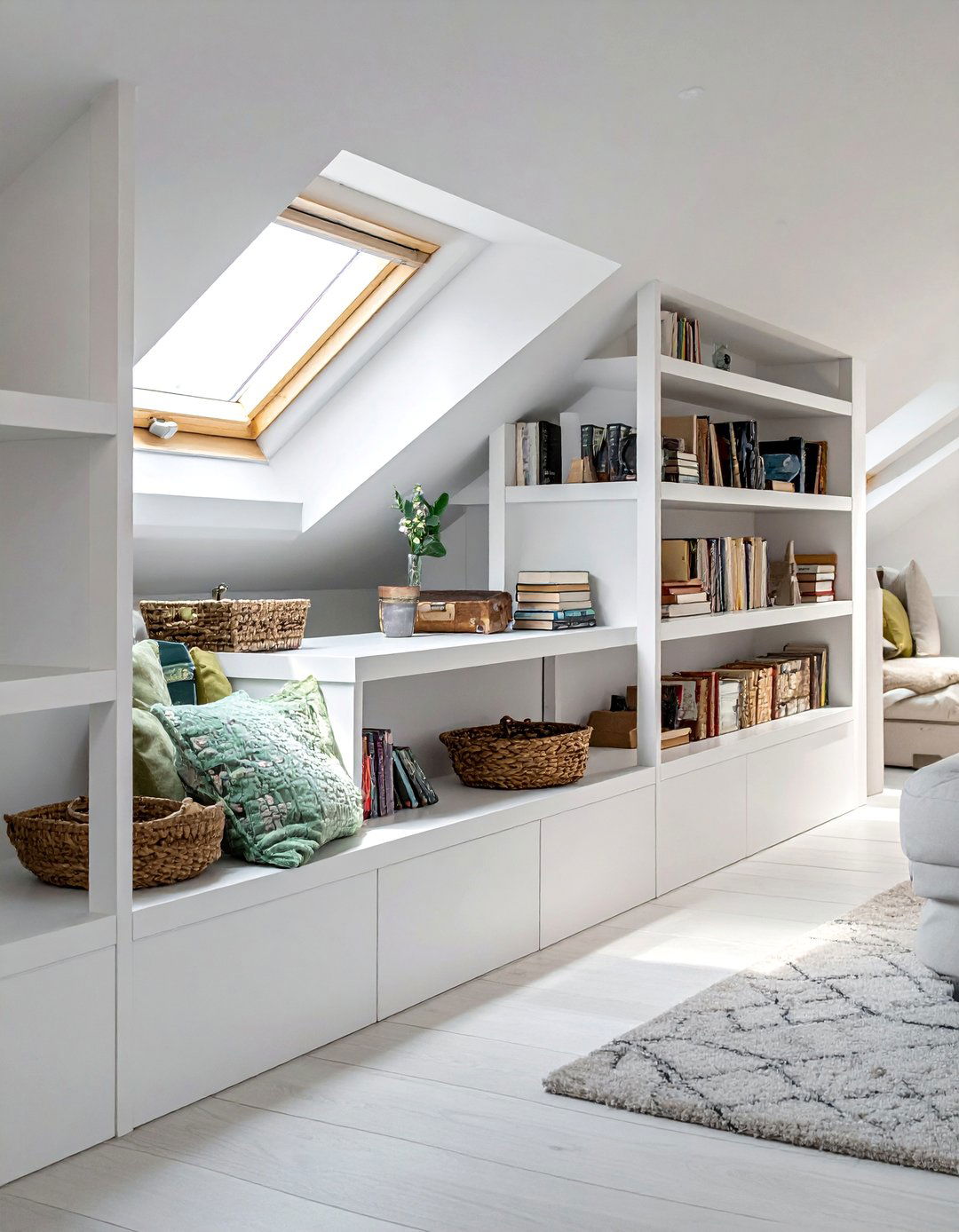
Custom-built, low bookshelves that fit snugly against the knee walls are a perfect solution for a small attic room. These units provide essential storage without consuming valuable vertical space. By keeping the shelving below waist height, you maintain a clear line of sight across the room, which helps it feel more open. Use these shelves to organize books, display decor, or store items in decorative baskets. Painting the built-ins the same color as the walls allows them to blend in seamlessly, preventing the room from looking cluttered while offering a practical and stylish way to keep your attic tidy and functional.
7. A Minimalist Attic Home Office Setup
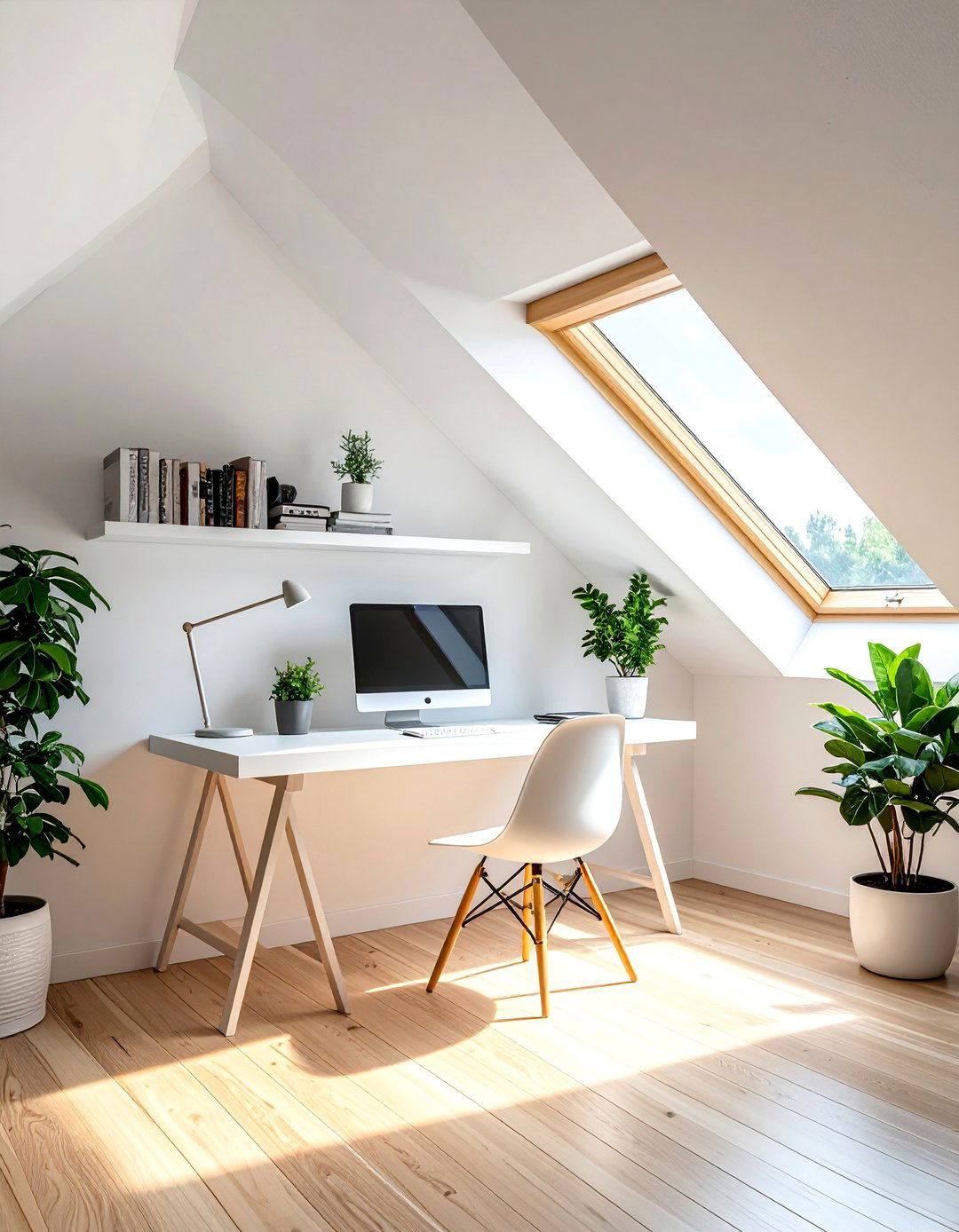
Creating a minimalist home office in a small attic room focuses on functionality and simplicity. Position a slim, low-profile desk against a wall, ideally beneath a skylight or window to maximize natural light and reduce eye strain. Choose a leggy desk and an armless chair to enhance the sense of space. Keep the desktop clear of clutter by using wall-mounted shelves or a small filing cabinet tucked under the desk. A monochromatic color scheme, such as shades of white and gray, will contribute to a clean, uncluttered, and calming work environment, making the attic a perfect spot for focused productivity without feeling confined.
8. Floor-Level Seating and Cushions
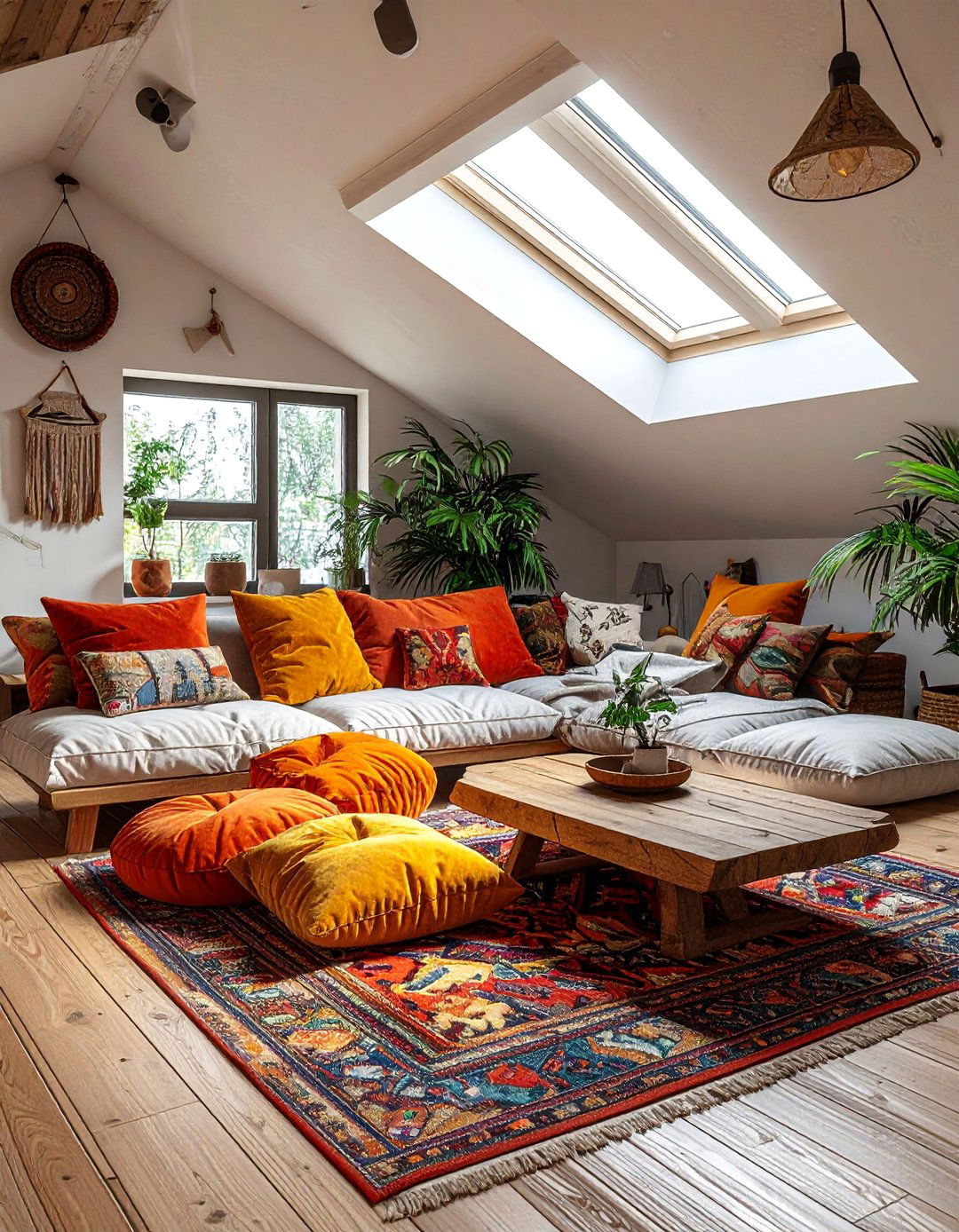
Embrace the low ceiling height by creating a cozy lounge area with floor-level seating. This bohemian-inspired approach makes the limited vertical space feel intentional and comfortable. Arrange a collection of large floor cushions, poufs, and a low-slung coffee table to form an inviting conversation pit or relaxation zone. A soft, plush area rug will anchor the space and add another layer of comfort. This setup is perfect for a media room, a reading nook, or a meditation space. It encourages a relaxed posture and makes the room feel like a deliberate, stylish sanctuary designed for comfort and ease.
9. Strategic Use of Mirrors to Expand Space
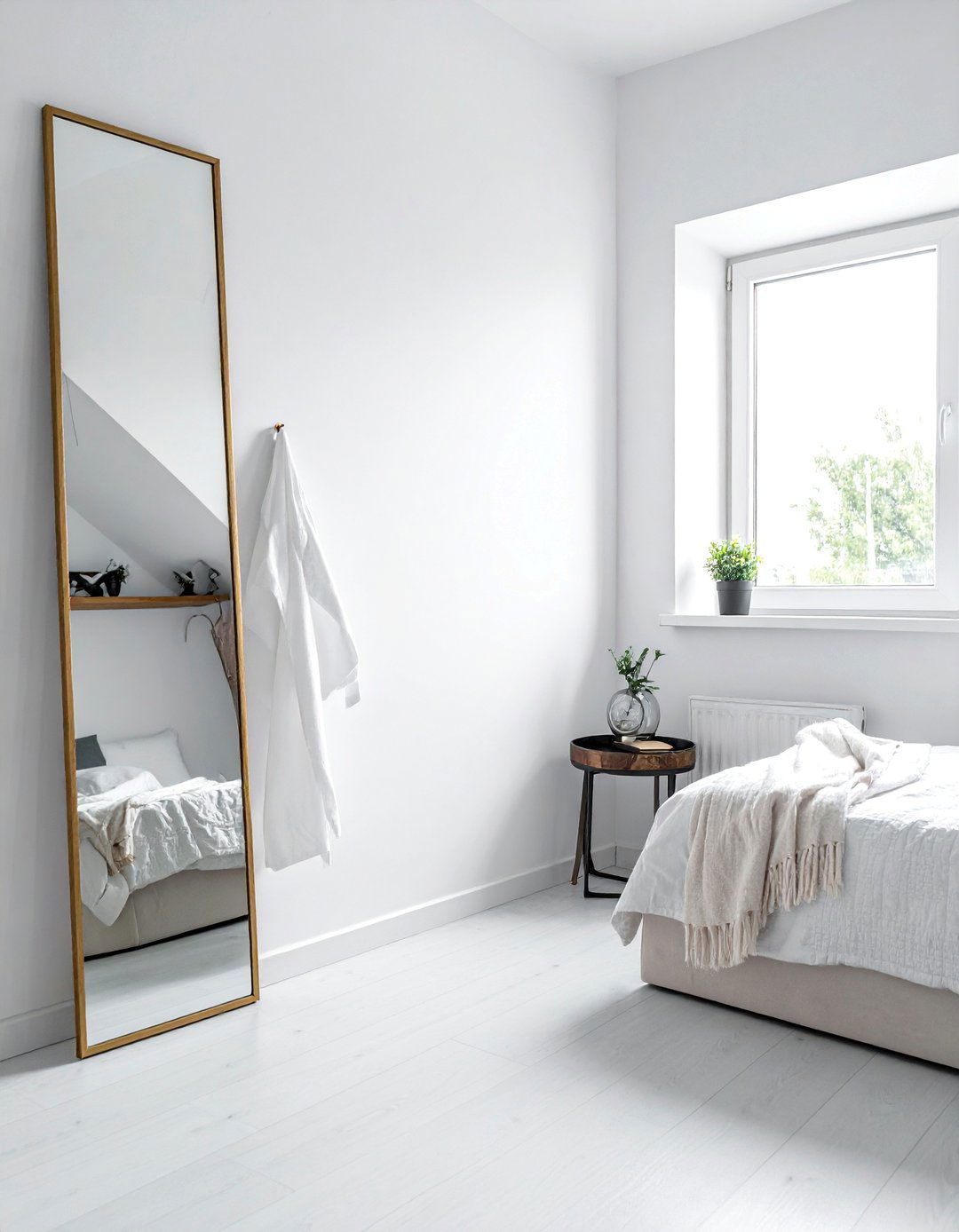
Mirrors are a classic design tool for making small spaces feel larger, and they work wonders in a low-ceiling attic. Place a large, floor-length mirror against one of the taller walls to create an illusion of depth and reflect light throughout the room. Another effective strategy is to use mirrored closet doors or furniture with mirrored surfaces. This not only adds a touch of glamour but also bounces light around, making the attic feel significantly brighter and more open. The reflection creates a sense of continuity, visually doubling the space and helping to diminish the feeling of being in a confined area.
10. Wall-Mounted Sconces and Up-Lighting
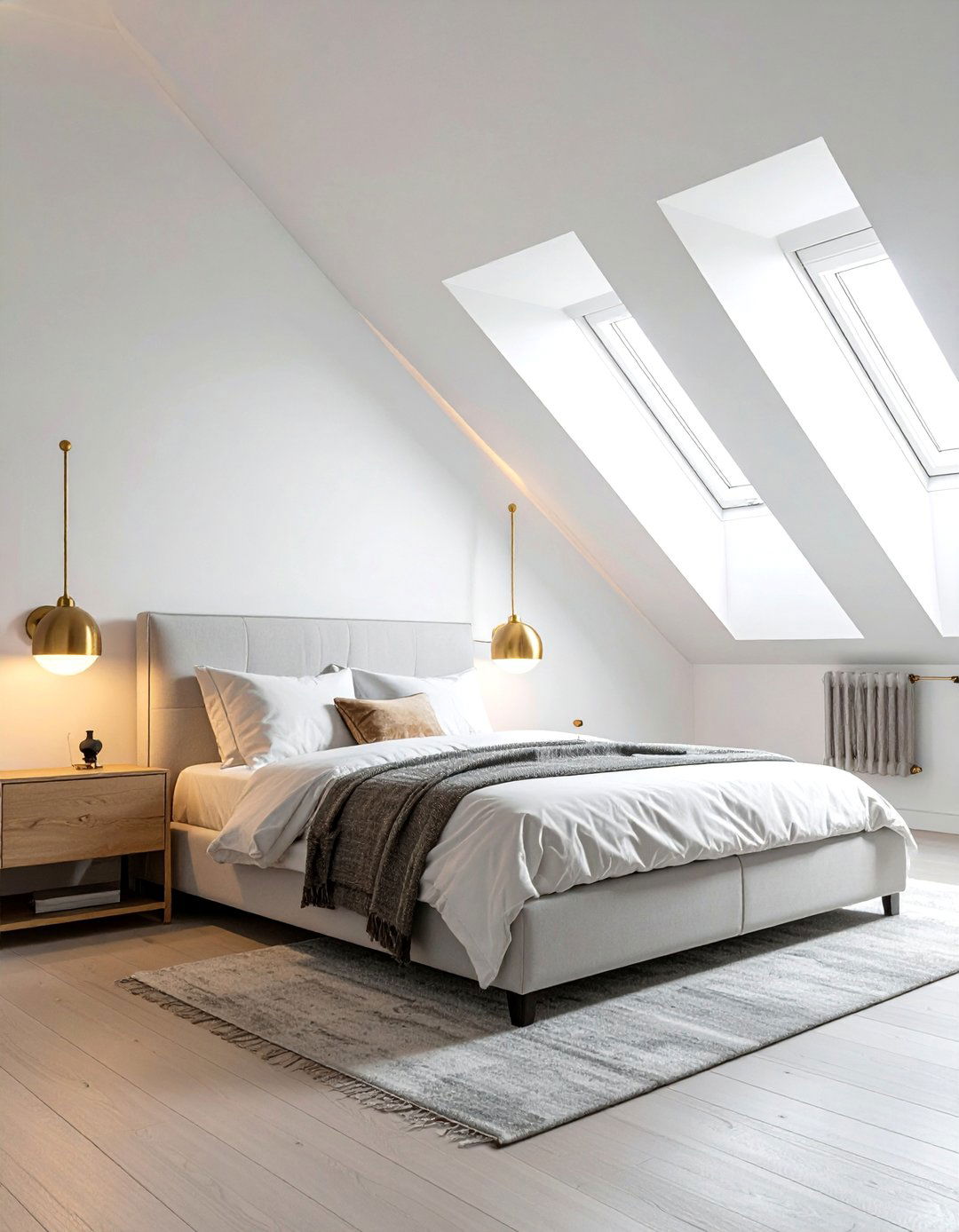
Proper lighting is crucial in a low-ceiling attic, where traditional pendant lights are often impractical. Wall-mounted sconces are an excellent alternative, providing ambient or task lighting without taking up any vertical space. Position them to cast light upwards, a technique known as up-lighting, which washes the ceiling in light and creates the illusion of more height. You can also place floor lamps in corners, directing their light toward the ceiling. This layered lighting approach eliminates shadows and creates a warm, inviting atmosphere, making the attic feel brighter and more spacious while adding a sophisticated design element to the walls.
11. A Cohesive All-White Color Palette
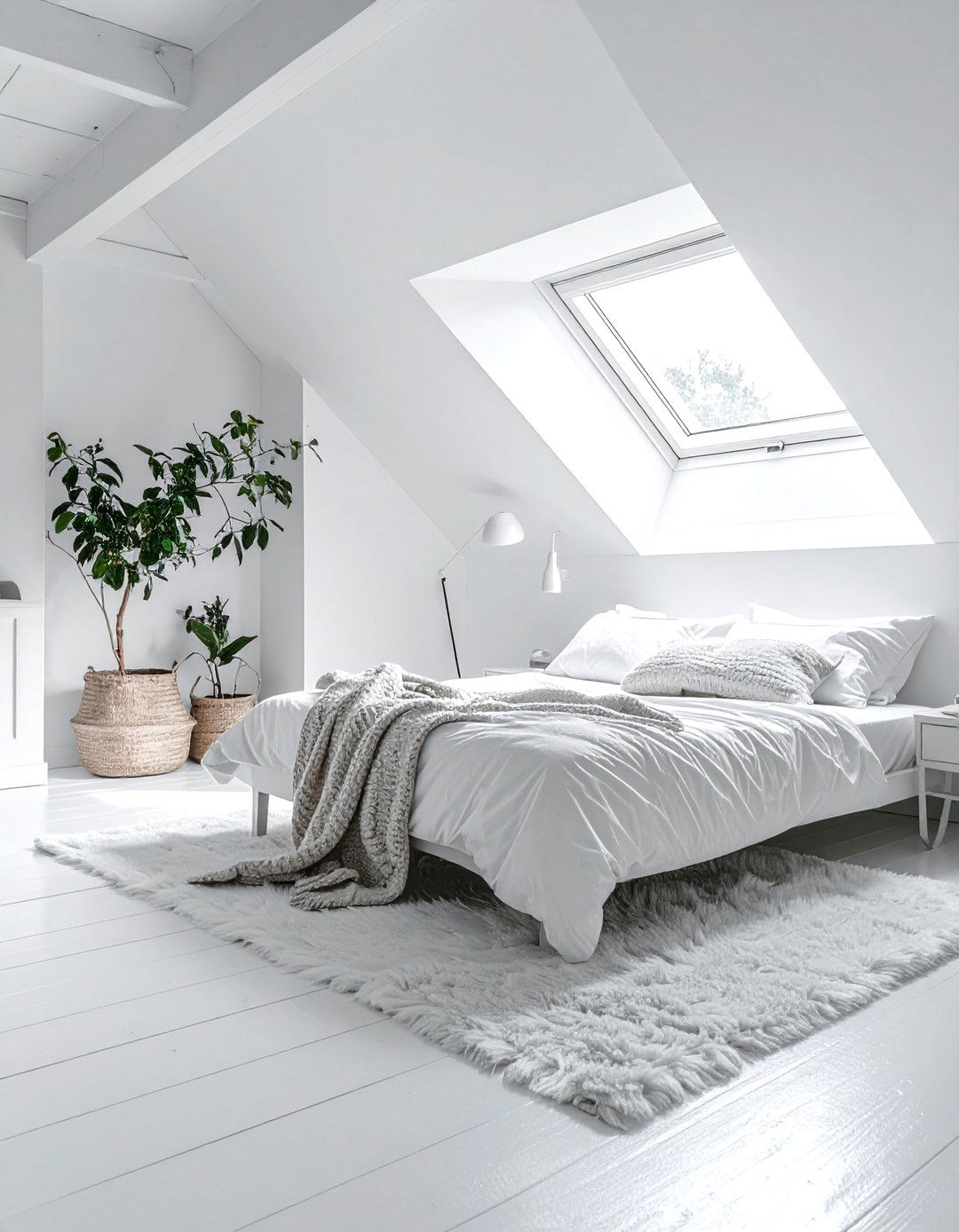
Decorating a small attic room entirely in white is a powerful strategy to make it feel airy, bright, and spacious. White walls, ceilings, and even floors reflect maximum light, whether natural or artificial, which visually pushes back the boundaries of the room. This monochromatic scheme creates a seamless, cohesive look that minimizes the visual distraction of awkward angles and slanted ceilings. To prevent the space from feeling sterile, introduce different textures through a fluffy rug, a knitted throw blanket, linen curtains, and light-colored wood furniture. This approach results in a serene and expansive-feeling retreat despite its physical limitations.
12. Low-Hanging Art and Decor
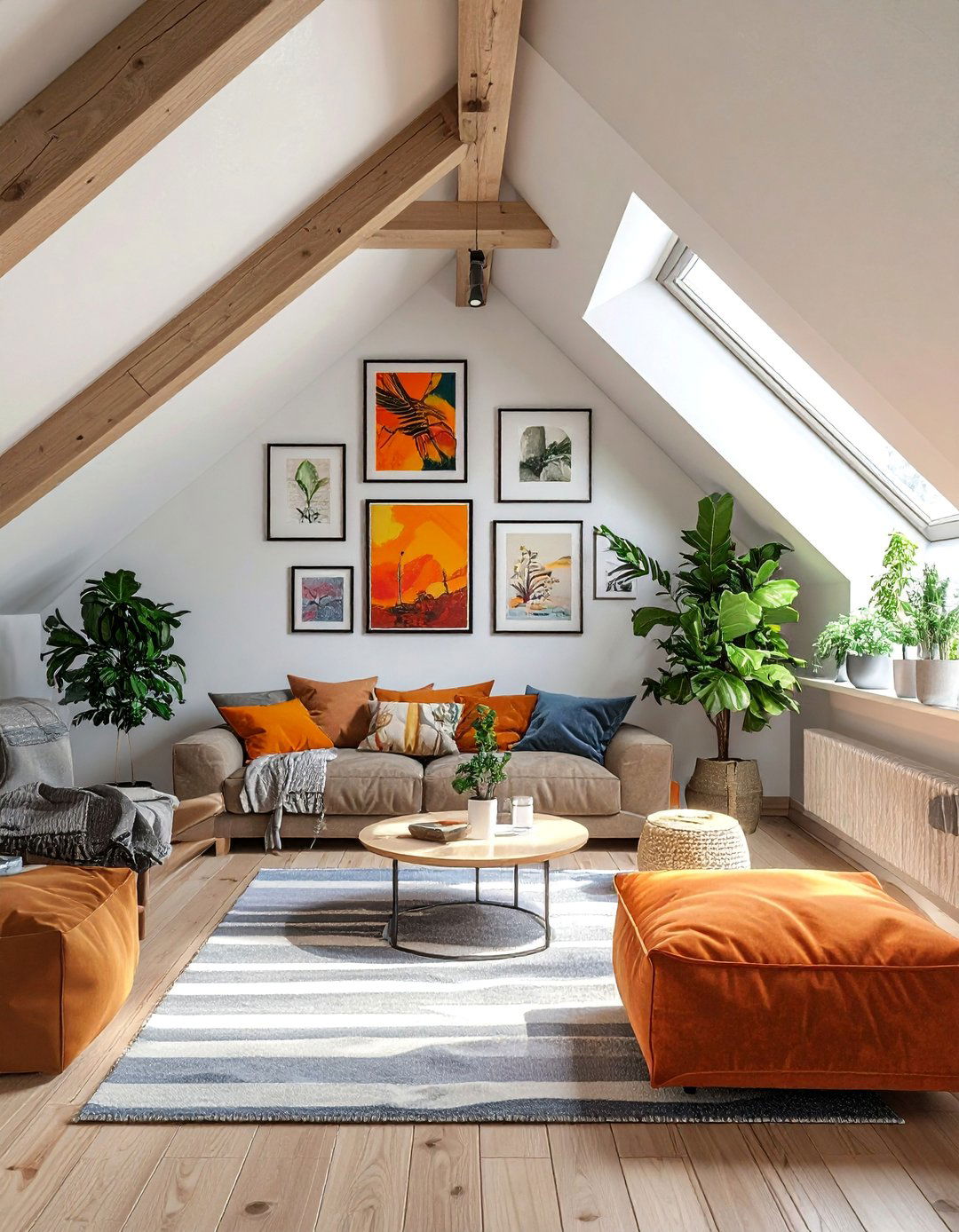
When decorating the walls of a low-ceiling attic, the placement of art and decor is key. Hang artwork and photographs lower than you normally would, typically with the center point around eye level when seated. This simple trick draws the eye downward and away from the low ceiling, creating a more balanced visual experience. It also helps to ground the space and make it feel more intimate and intentional. Opt for a gallery wall of smaller frames or a single, large horizontal piece to emphasize the width of the room. This thoughtful arrangement prevents the walls from feeling top-heavy and contributes to a cozy, well-proportioned aesthetic.
13. Floating Desks and Shelving Units
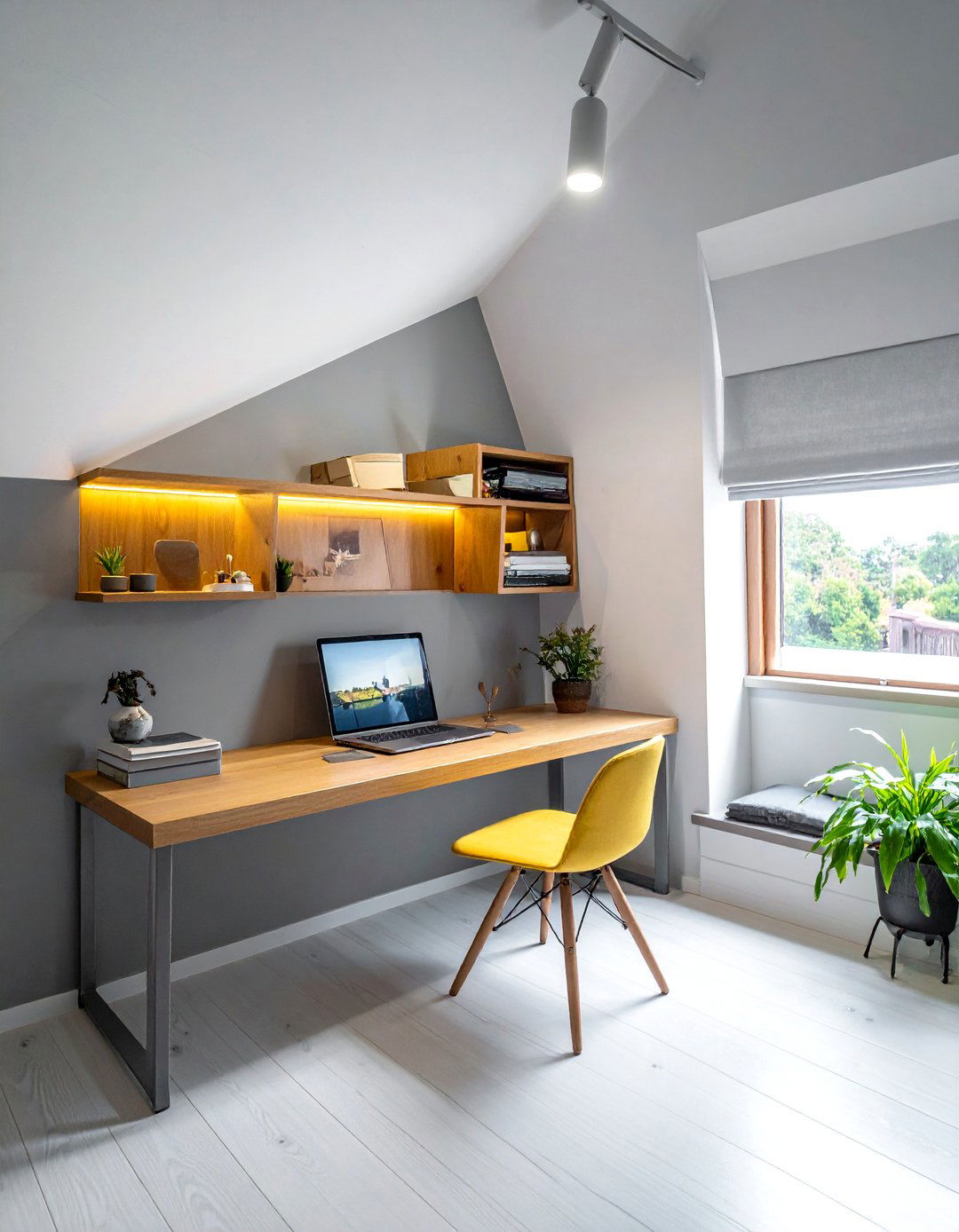
To maximize floor space in a compact attic room, install floating desks and shelving units. By mounting these elements directly to the wall, you eliminate the need for bulky legs or supports, which creates a lighter, more open feel. A floating desk can be fitted perfectly into a small nook, providing a functional workspace without overwhelming the room. Similarly, floating shelves offer storage and display options without the visual weight of traditional bookcases. This minimalist approach is perfect for home offices, study areas, or hobby rooms, ensuring every square foot is used efficiently while maintaining a clean and uncluttered look.
14. Creating a Cozy Reading Nook
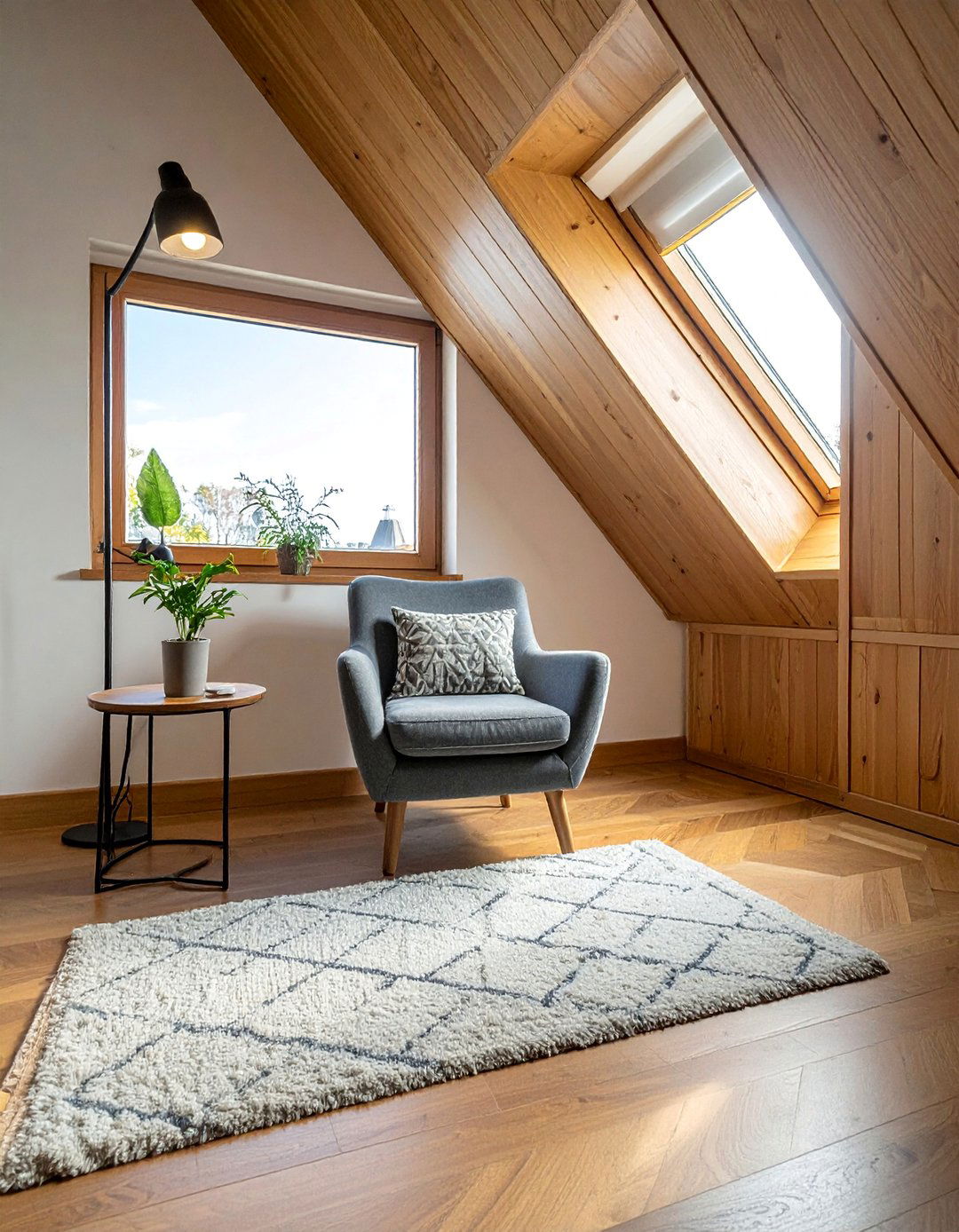
Transform an unused corner of your small attic room into a dedicated reading nook. The sloped ceilings and intimate scale of an attic are naturally suited for creating a cozy, den-like atmosphere. Place a comfortable armchair or a soft chaise lounge in a corner, preferably near a window for natural light. Add a small side table for your book and a cup of tea, and ensure you have a good reading lamp, such as a slim floor lamp or a wall sconce. A plush area rug and a basket of soft blankets will complete the space, turning it into the perfect quiet escape for getting lost in a good story.
15. A Multi-Functional Guest Room with a Daybed
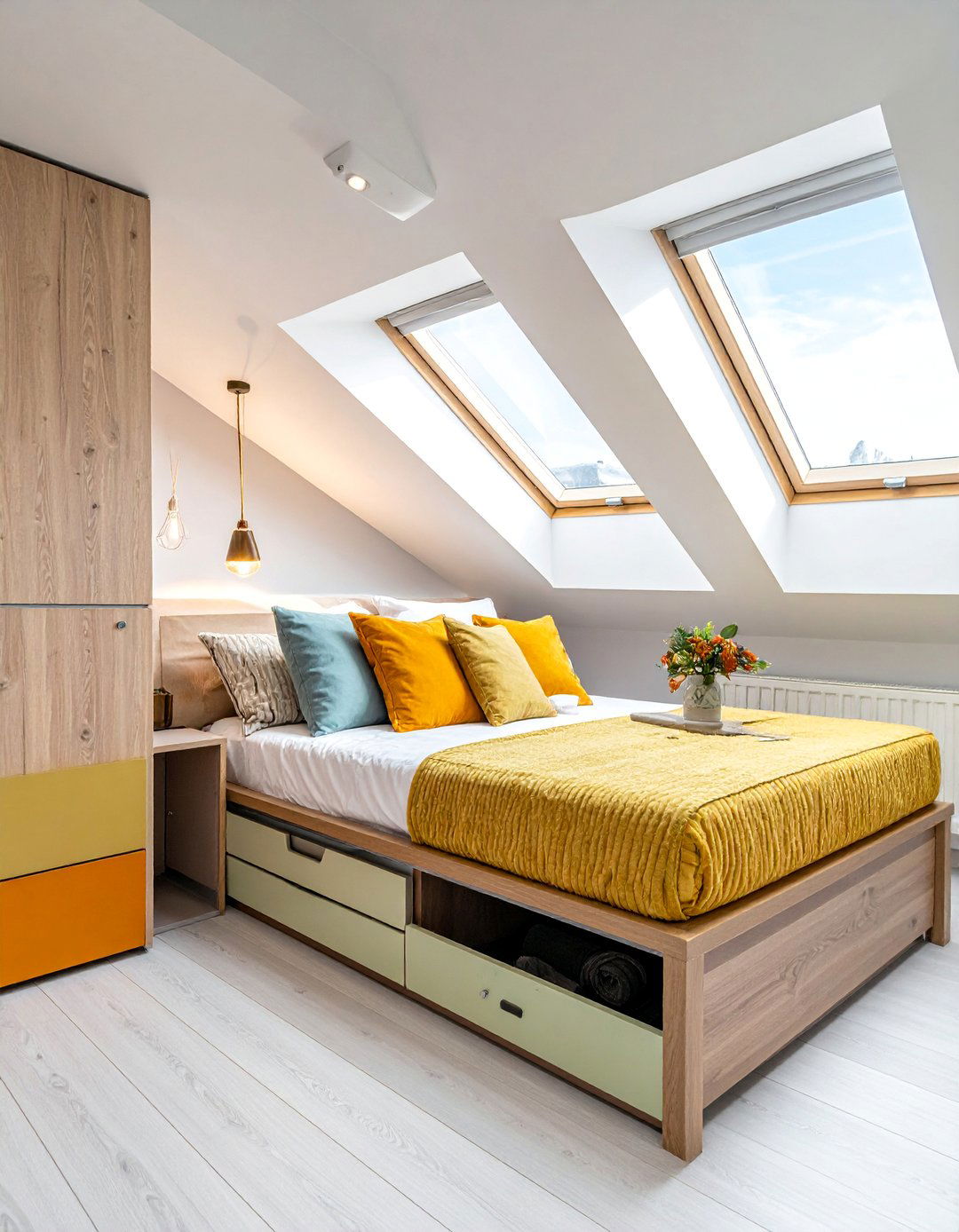
A small attic can serve as a highly practical multi-functional guest room when furnished with a daybed. A daybed acts as a comfortable sofa for lounging, reading, or working during the day and easily transforms into a cozy bed for overnight guests at night. This versatility is ideal for a space that needs to serve multiple purposes. Choose a daybed with a simple, low-profile frame to avoid overwhelming the room. Many models also come with built-in drawers or a trundle, offering extra storage or an additional sleeping spot without taking up more floor space, making your attic both welcoming and efficient.
16. Exposing and Highlighting Ceiling Beams
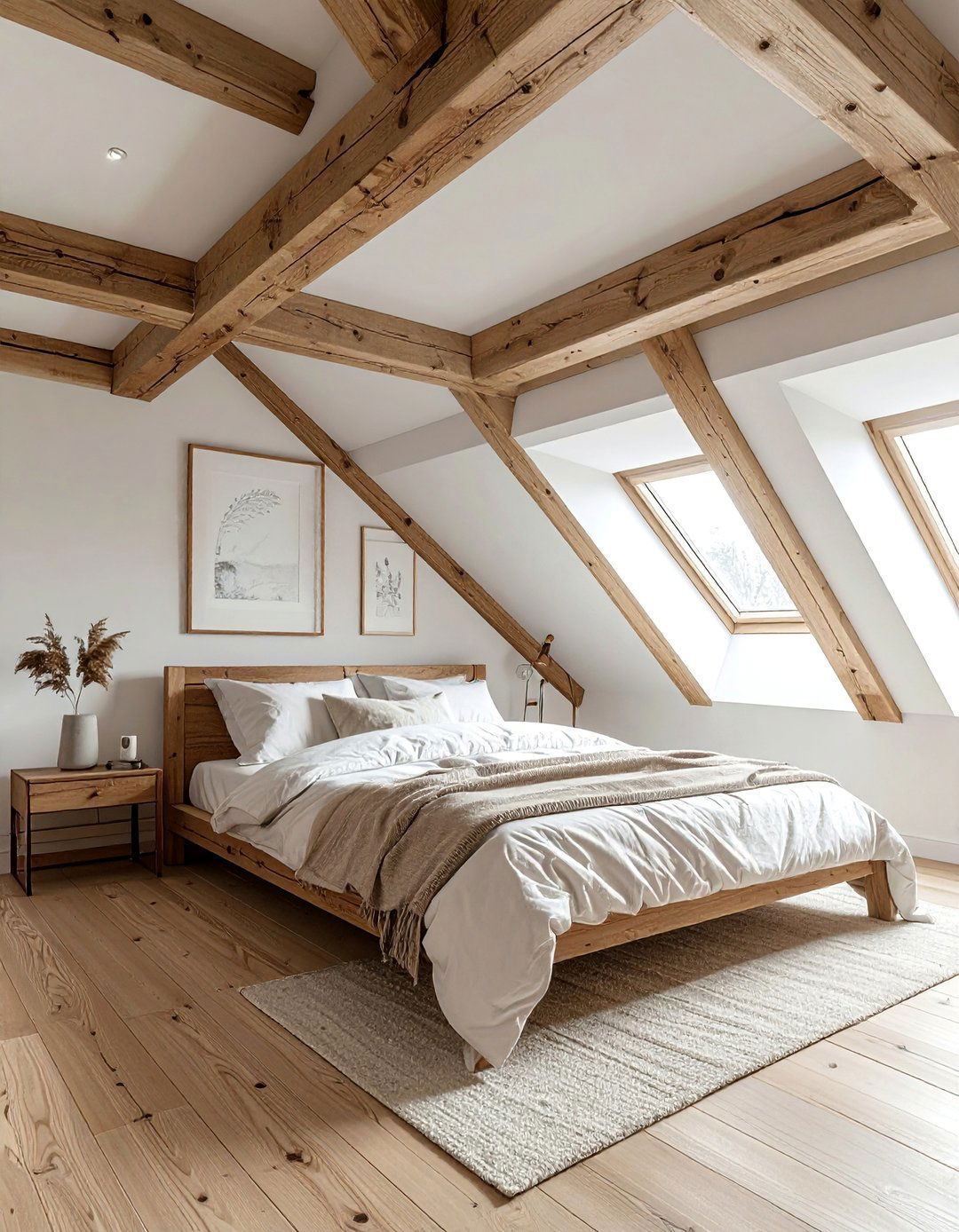
If your attic has structural beams, don't hide them—highlight them. Exposing and celebrating these architectural elements can add immense character and visual interest to a low-ceiling room. Sand them down and leave them in their natural wood state for a rustic, warm feel, or paint them white to blend with the ceiling for a more subtle, modern Scandinavian look. Painting the beams a contrasting color can also make a bold design statement. By drawing attention to the beams, you create a feature that distracts from the low ceiling height and adds a sense of history and texture to the space.
17. A Serene Attic Yoga and Meditation Space
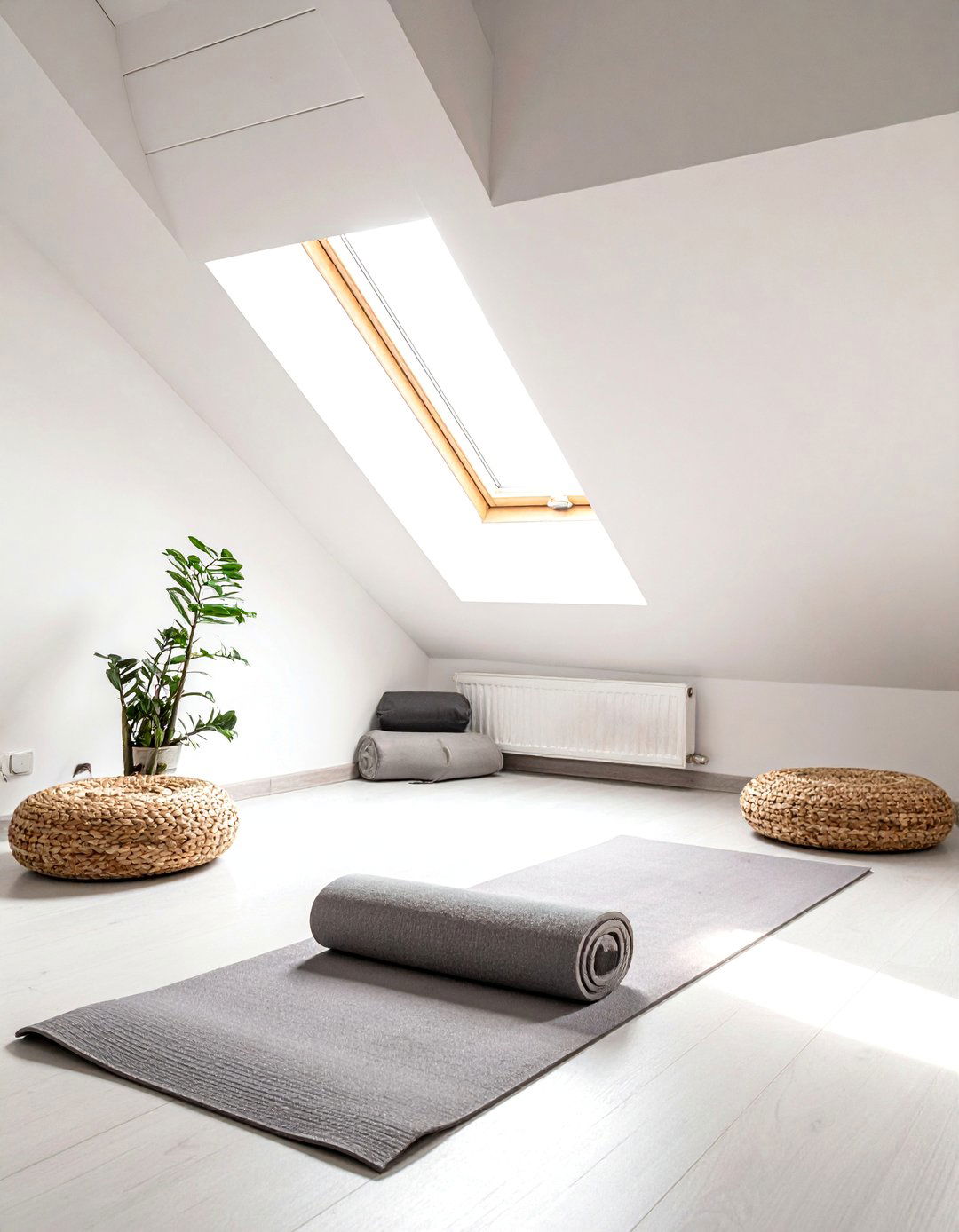
The quiet, removed nature of an attic makes it an ideal location for a personal yoga and meditation space. Keep the design minimal and serene to promote a sense of calm. Use a light, soothing color palette on the walls and floors. Place a yoga mat in the center of the room, and add a small altar or low table for candles, incense, or meaningful objects. A few floor cushions and a soft blanket can be used for meditation. Natural elements like a small plant or a piece of driftwood can enhance the connection to nature. This simple setup transforms a small attic into a peaceful sanctuary for mindfulness and well-being.
18. Attic Playroom with Low-Level Furniture
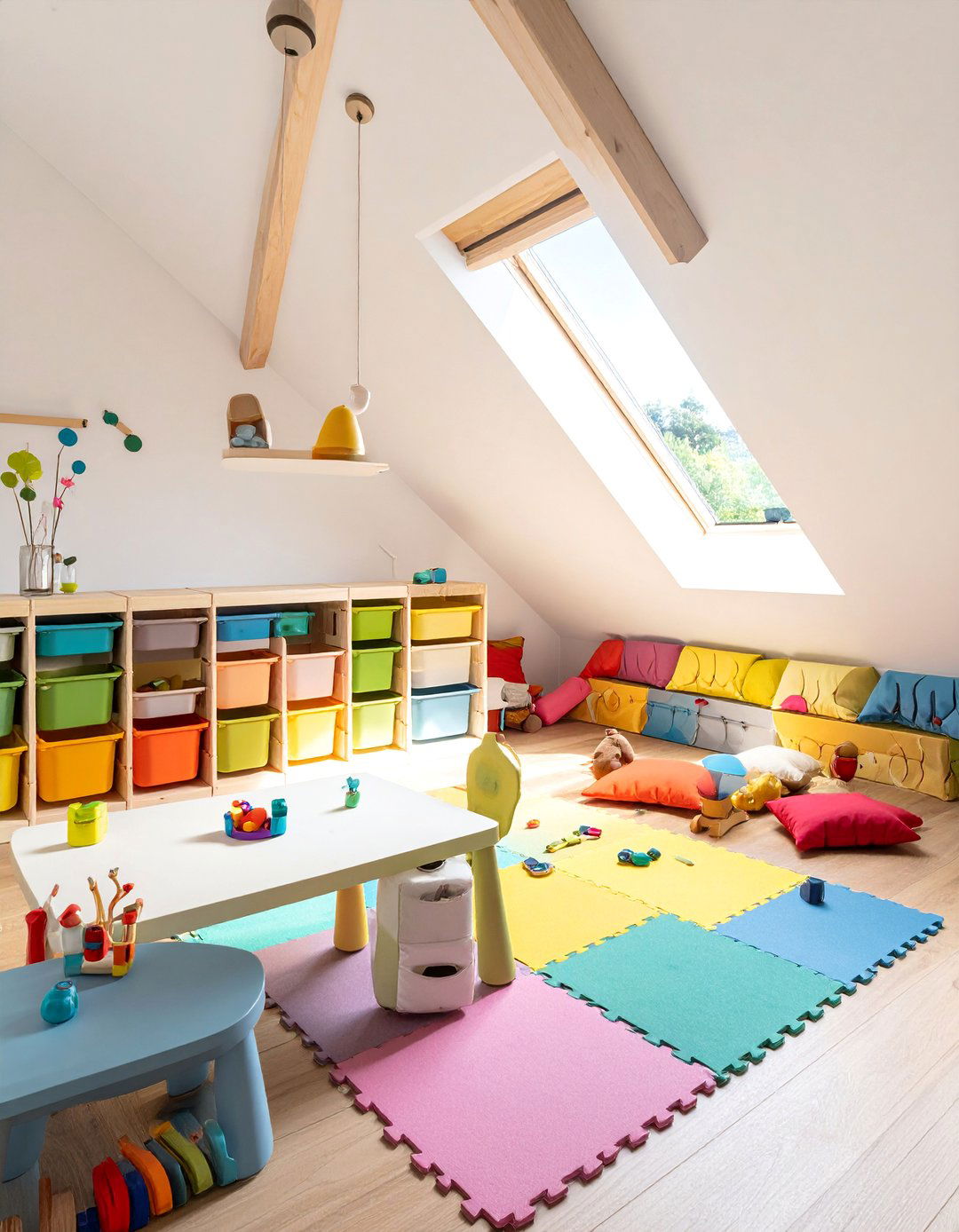
Convert your small attic into a magical playroom for children. The low ceilings and cozy nooks are perfectly scaled for kids, making them feel like the space is their own special hideaway. Furnish the room with child-sized tables, chairs, and low-level storage units that are easy for them to access. A soft, durable rug is a must for comfortable floor play. Use the slanted walls as a canvas for a fun mural or decorate with whimsical decals. Beanbags and floor cushions provide flexible seating, creating a safe, imaginative, and contained area where kids can play freely.
19. A Walk-In Closet and Dressing Room
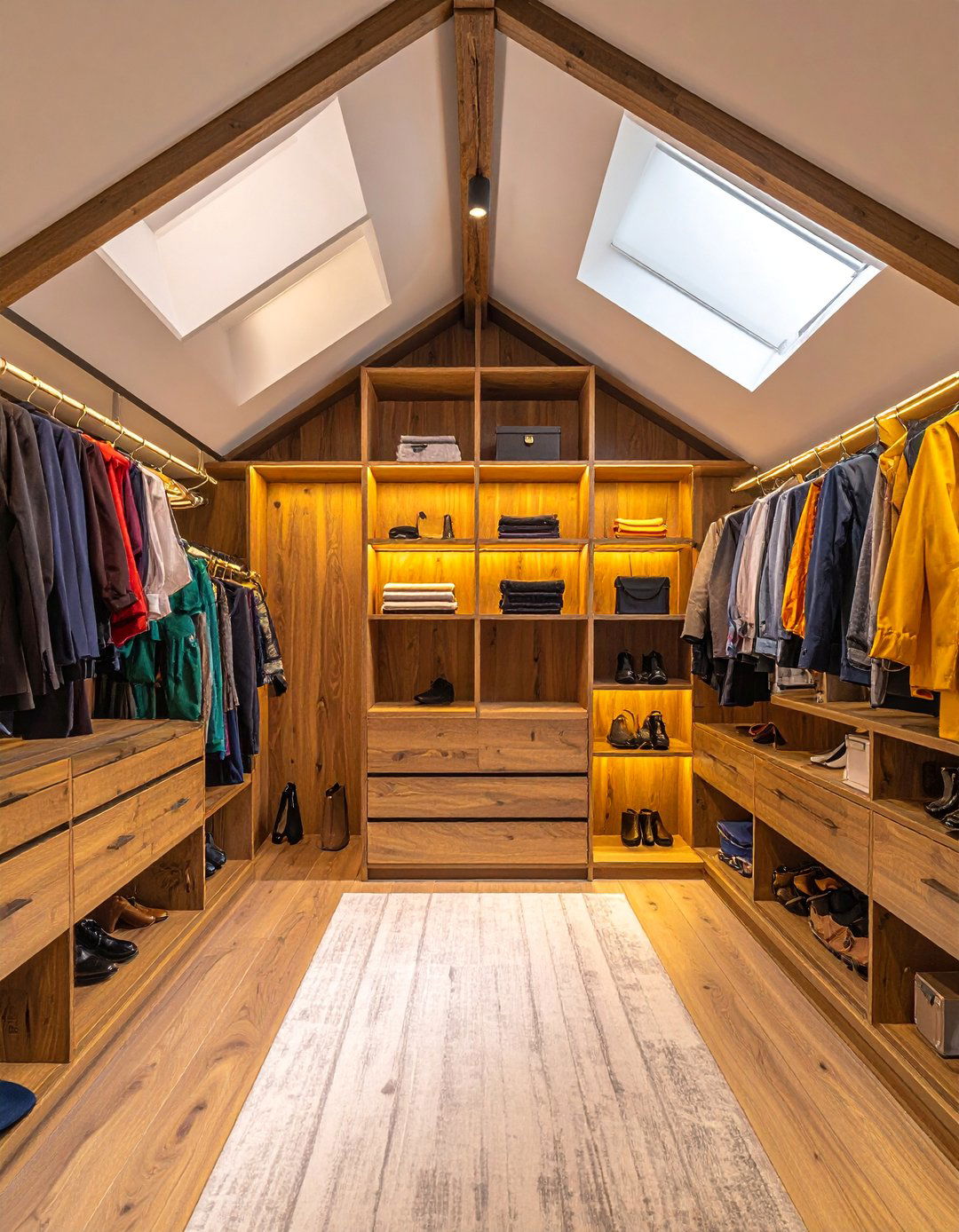
A small attic can be transformed into a dream walk-in closet and dressing room with smart organization. Install low hanging rods along the knee walls for shirts and skirts, and use the taller wall space for full-length garments. Open shelving is perfect for folded clothes, shoes, and accessories. A low dresser can double as a vanity table when paired with a mirror hung on the wall. Good lighting is essential, so incorporate LED strip lights under shelves and a bright central fixture. This turns an underutilized space into a highly organized and luxurious personal dressing area, freeing up space in your main bedroom.
20. Rustic Farmhouse Attic Bedroom Design
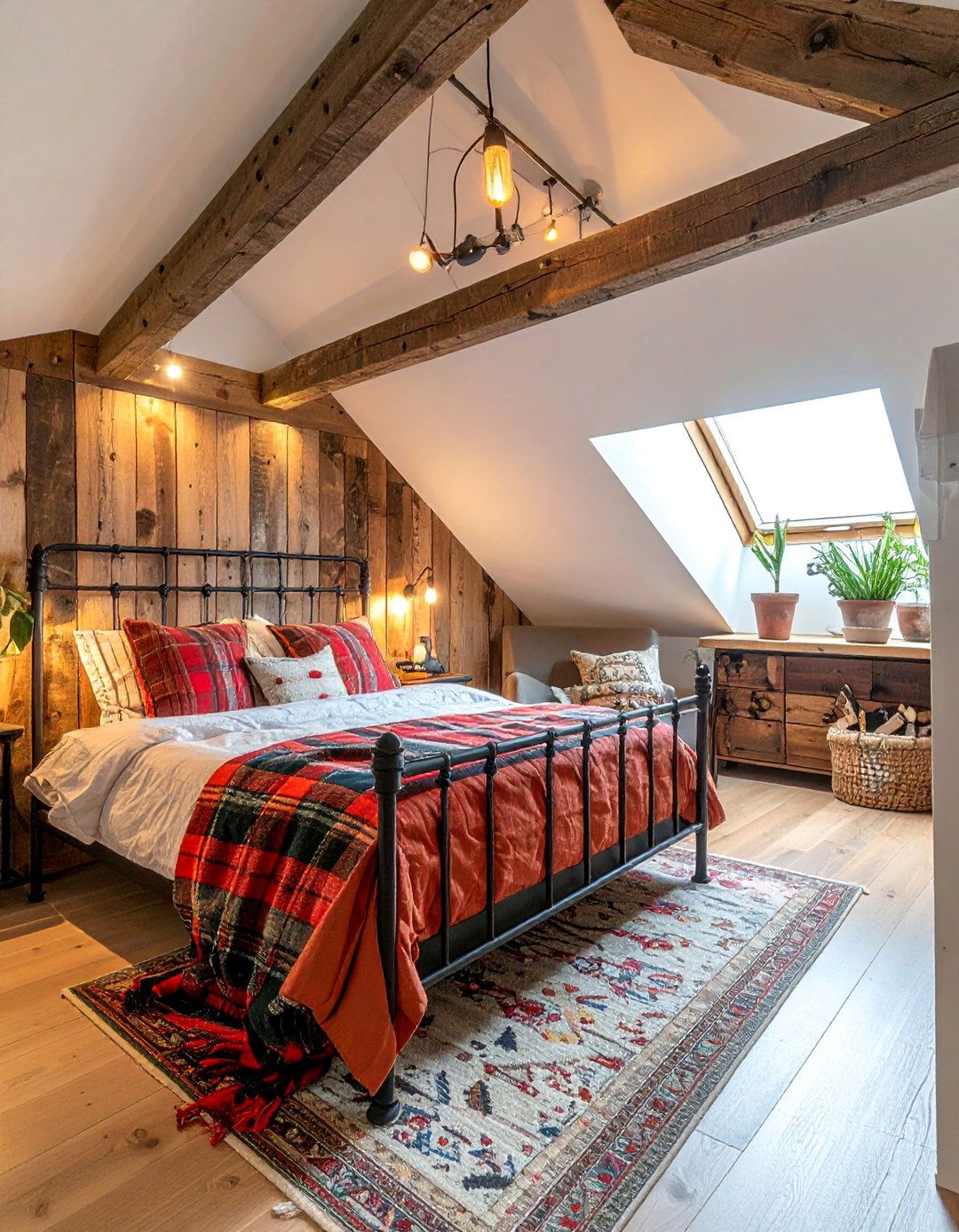
Embrace a rustic farmhouse aesthetic to create a warm and inviting attic bedroom. This style works beautifully with the inherent character of an attic. Use reclaimed wood for a feature wall or a custom headboard. Furnish the space with simple, sturdy wooden furniture and vintage-inspired metal accents. A classic iron bed frame can be a charming focal point. For textiles, opt for natural materials like linen, cotton, and wool in a neutral color palette with plaid or floral patterns. An antique trunk can serve as both a coffee table and a storage unit, completing the cozy, lived-in feel of a country retreat.
21. Scandinavian-Inspired Simplicity
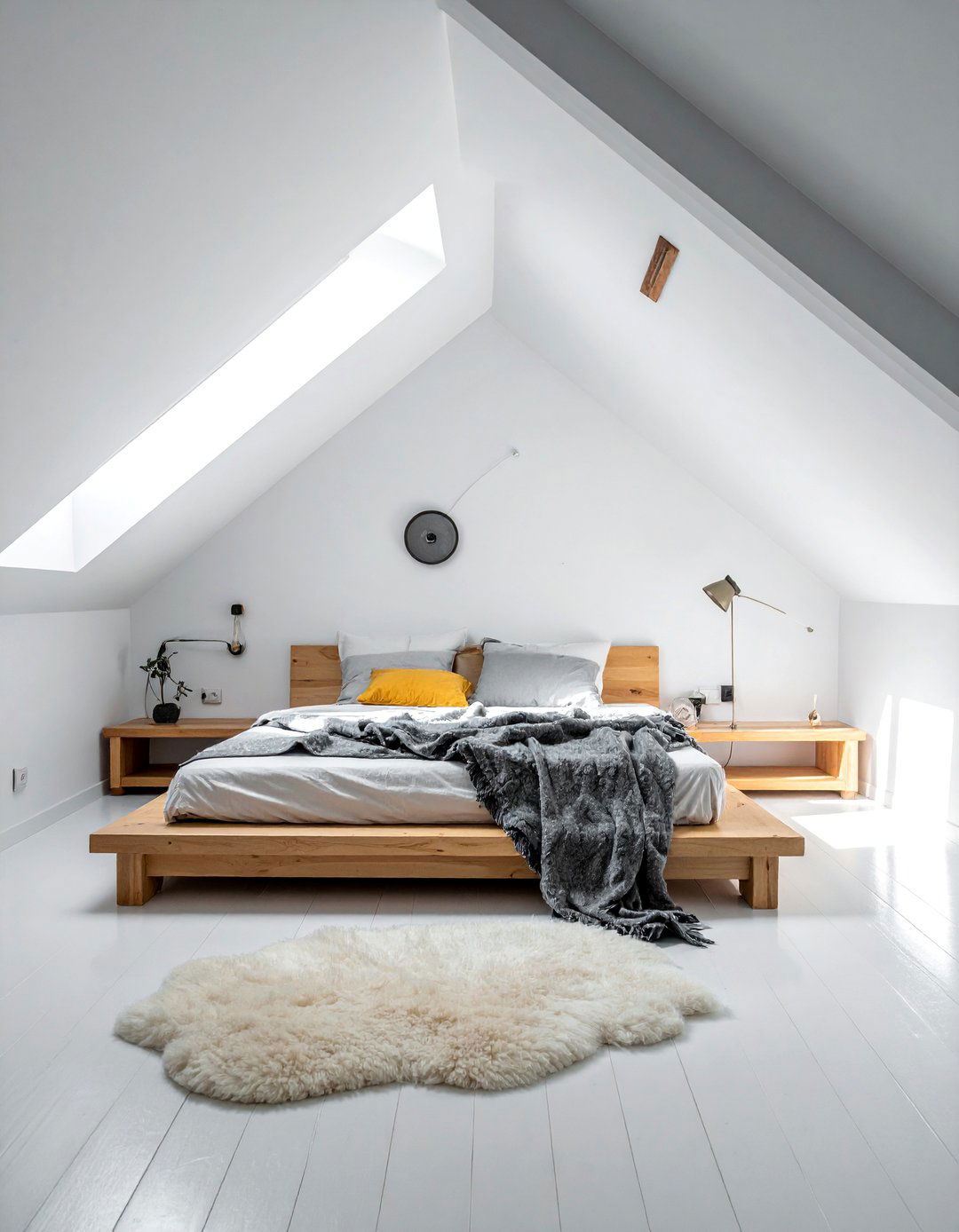
The principles of Scandinavian design—simplicity, minimalism, and functionality—are perfectly suited for a low-ceiling small attic room. Adhere to a light and neutral color palette, primarily whites, grays, and light wood tones, to create a bright and airy atmosphere. Choose furniture with clean lines and a minimalist aesthetic, such as a simple platform bed and leggy side tables. Maximize natural light and keep window treatments sheer or non-existent. Introduce texture and warmth through natural materials like wool blankets, sheepskin rugs, and live plants. This approach results in a space that is uncluttered, functional, and effortlessly stylish.
22. Compact Attic Home Gym
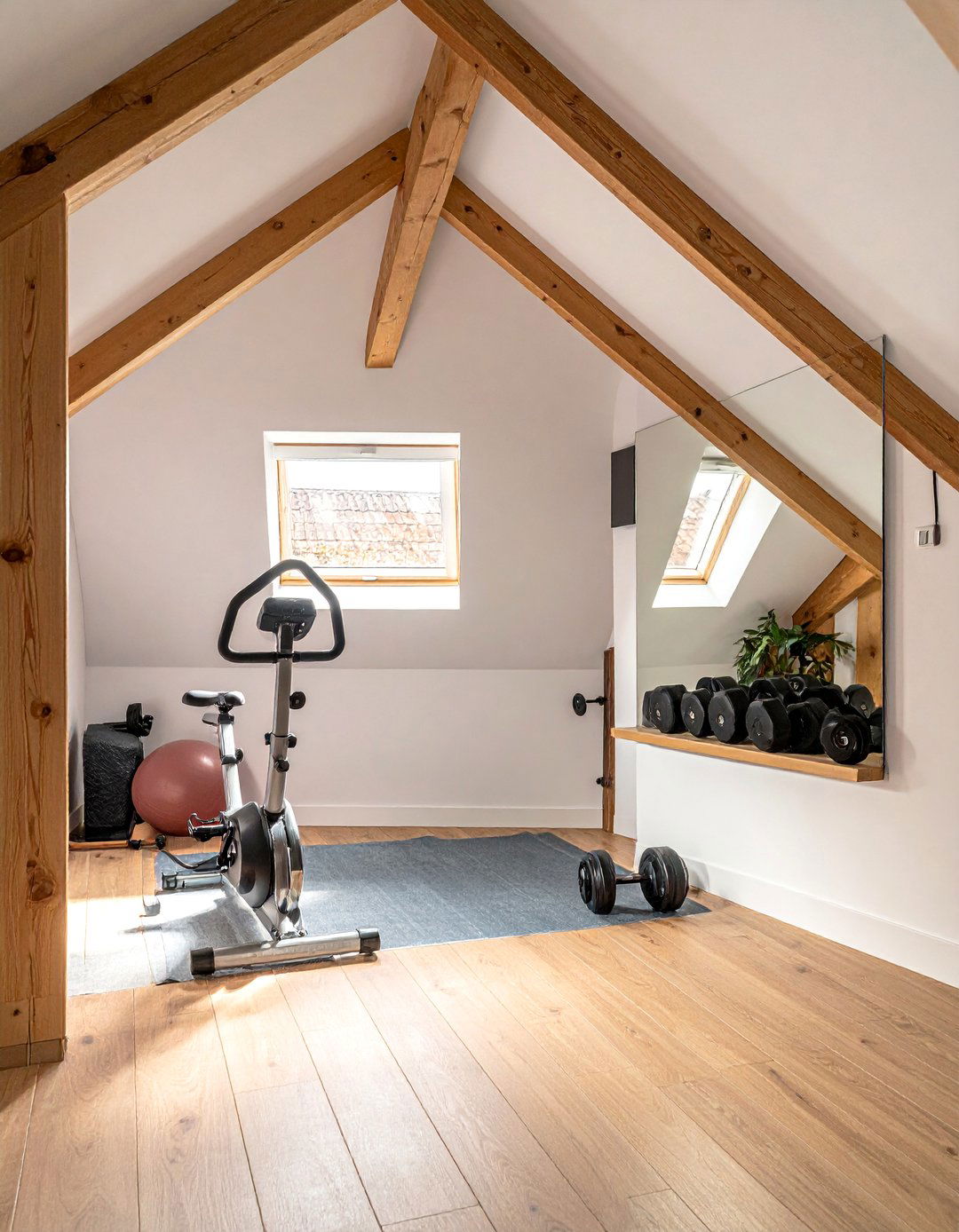
Dedicate your small attic space to a compact home gym, creating a private area for workouts. The low ceiling height is suitable for activities like yoga, Pilates, weight training, or using a stationary bike or rowing machine. Use interlocking rubber floor mats to protect the floor and absorb sound. Install a large mirror on one wall to create the illusion of more space and to help you check your form. Wall-mounted racks or shelves can keep weights, resistance bands, and other equipment organized and off the floor. This provides a convenient, dedicated fitness zone without taking over a main living area.
23. Bohemian Attic Lounge with Plants
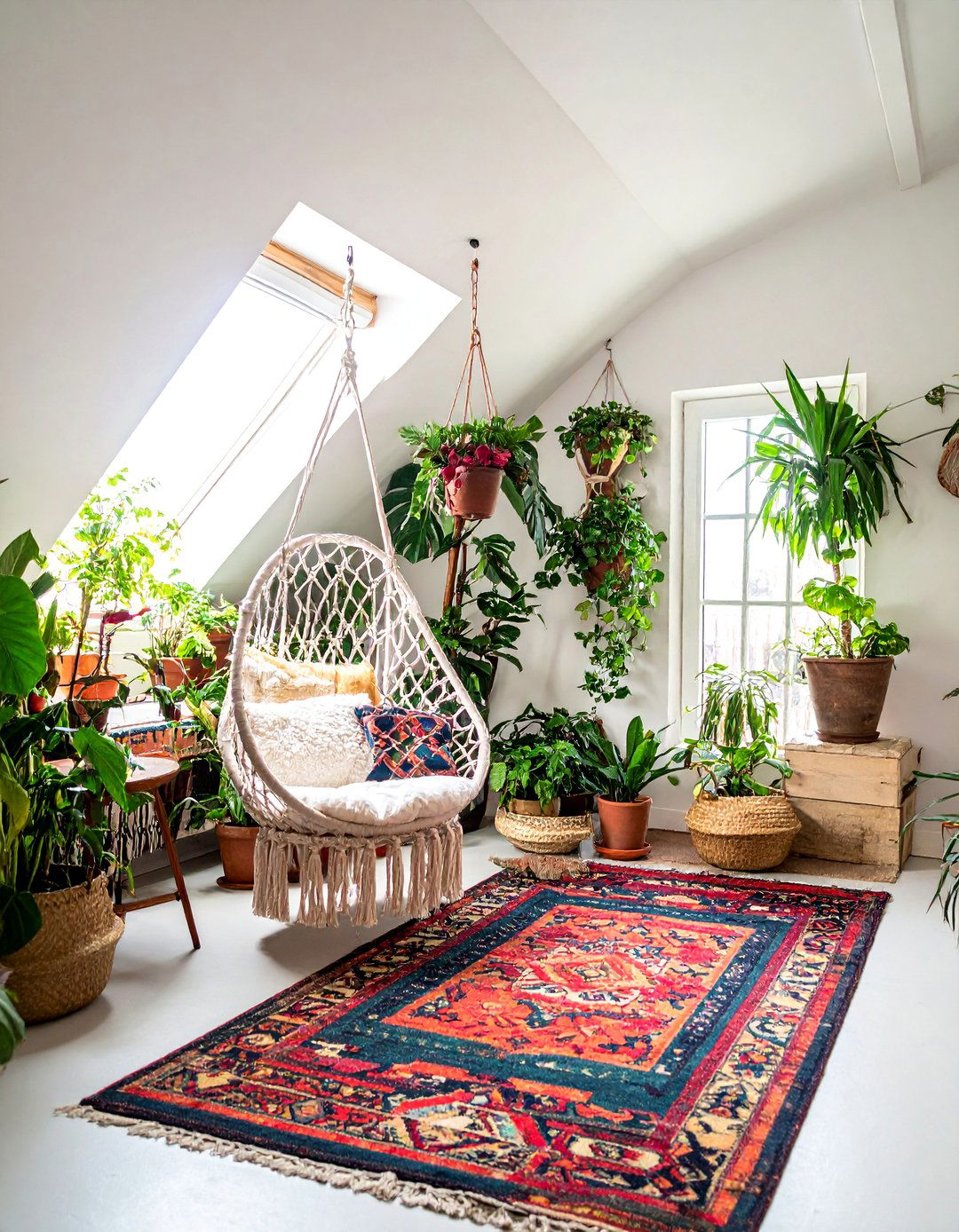
Infuse your attic with a relaxed, bohemian vibe to create an eclectic lounge space. This style celebrates a mix of patterns, textures, and natural elements. Layer patterned rugs on the floor and scatter an abundance of floor pillows and poufs for casual seating. A low-slung daybed or a hammock chair can serve as a comfortable centerpiece. Fill the space with a variety of houseplants, especially trailing plants that can hang from beams or sit on high shelves, to bring life and color into the room. Macrame wall hangings, string lights, and vintage finds will complete the free-spirited and cozy atmosphere.
24. A Hobby and Craft Room Retreat
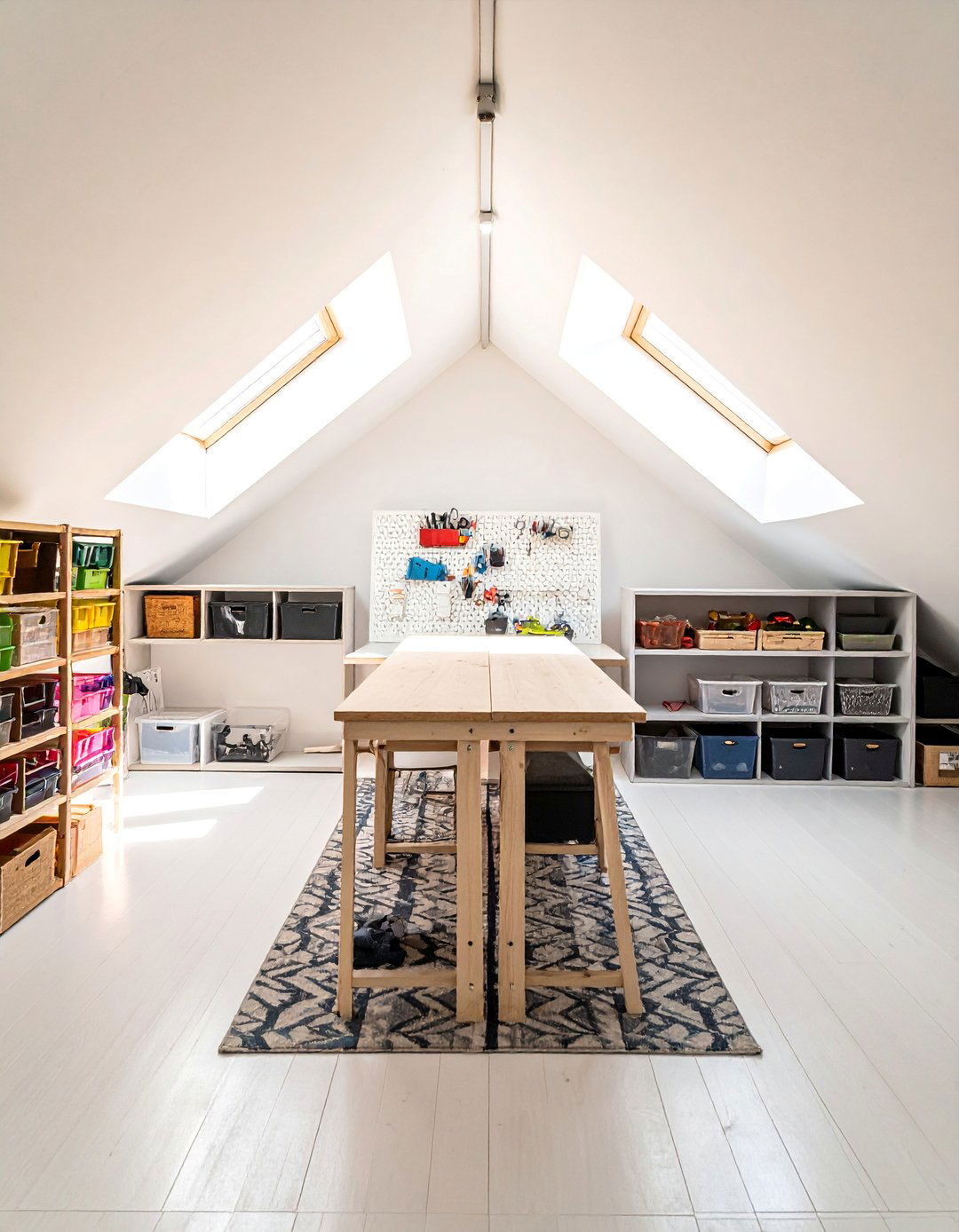
Designate your attic as a dedicated hobby or craft room, a perfect retreat for creative pursuits. Install a long, low worktable along one wall to provide ample surface area for projects. Use a pegboard on the wall to organize tools and supplies, keeping them visible and within easy reach. Open shelving and clear storage containers make it easy to find what you need. Ensure the space has excellent task lighting, such as an adjustable desk lamp or under-cabinet LED strips. This setup contains the mess of creative projects while providing a quiet, inspiring space to focus on your passion.
25. Coastal-Themed Attic Escape
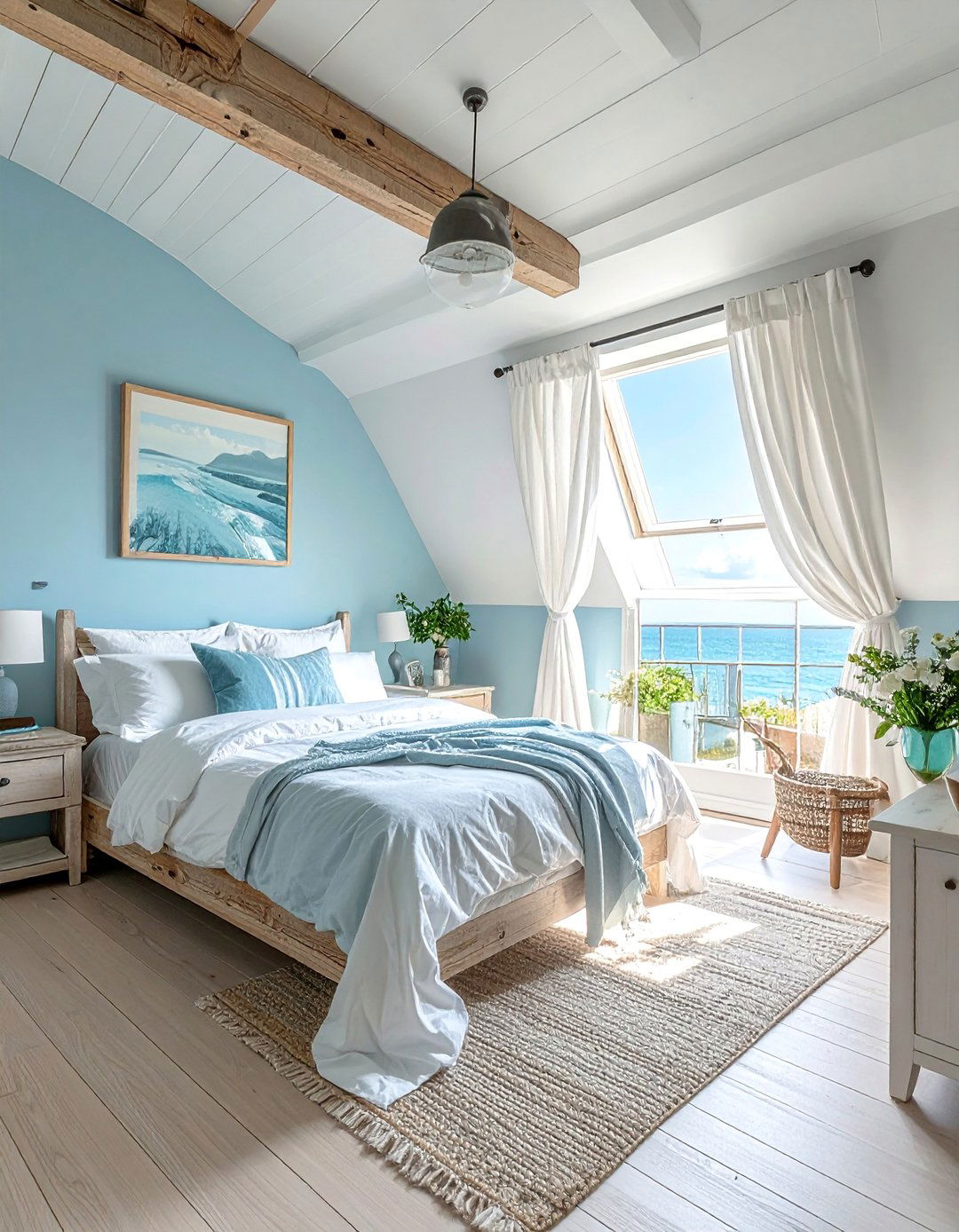
Bring a light and breezy coastal feel to your attic room to make it feel like a seaside escape. Paint the walls in a soft blue, sandy beige, or crisp white. Incorporate natural textures like jute or sisal for the rug and light, weathered wood for furniture. Simple, sheer white curtains on the windows will diffuse light beautifully and evoke the feeling of a beach house. Decorate with subtle nautical accents such as rope details, seashells in a glass jar, or artwork depicting seascapes. This theme is inherently bright and calming, making it an excellent choice for creating a serene and airy attic sanctuary.
26. A Sleek and Modern Media Room
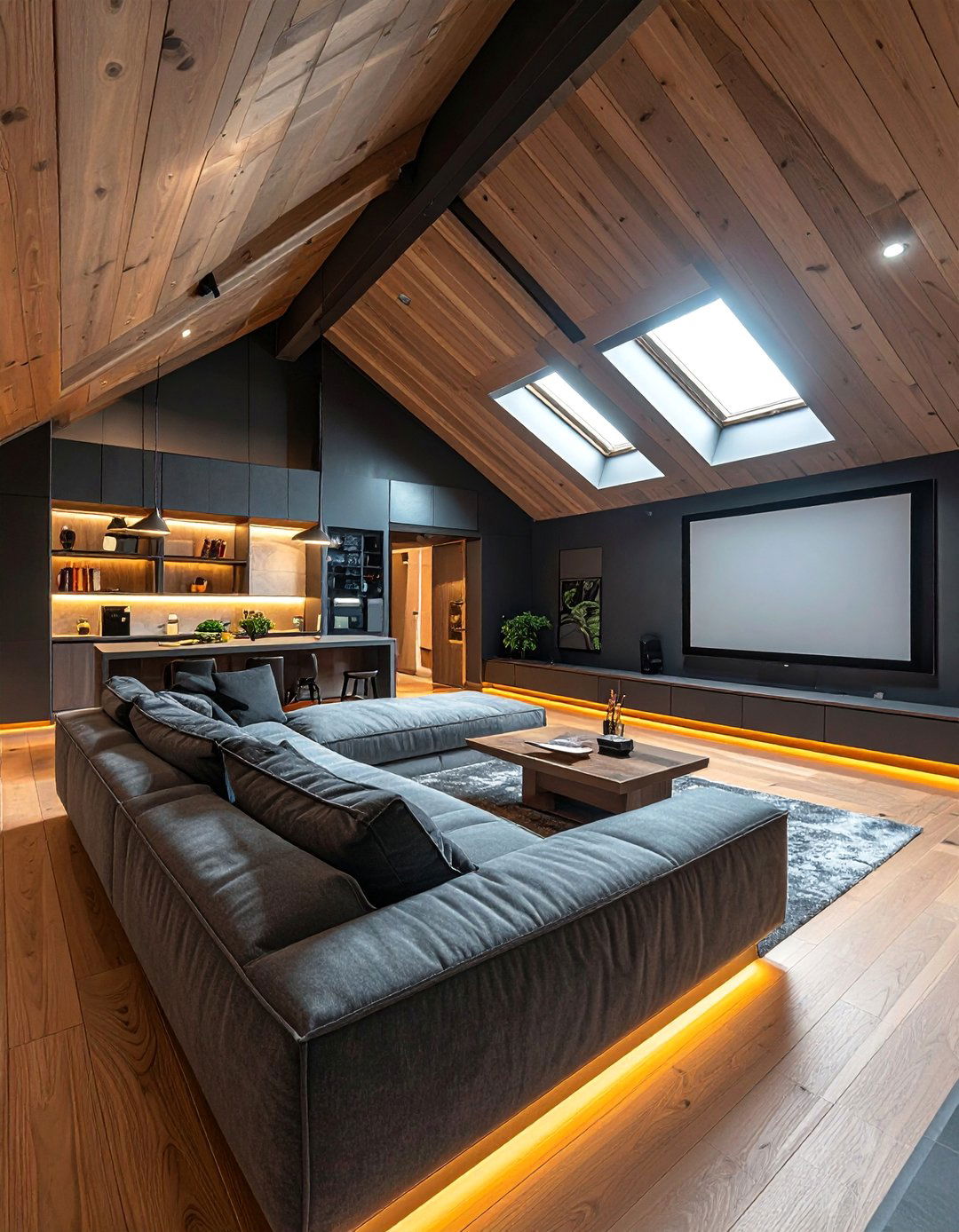
Transform your attic into a sleek and modern media room for an immersive entertainment experience. Paint the walls a dark color like charcoal gray or navy blue to reduce glare and create a cinematic atmosphere. Opt for a low-profile sectional sofa or comfortable reclining chairs. A long, low media console can house all your electronics and keep wires hidden. For sound, consider a compact soundbar or in-wall speakers to save space. Use blackout blinds on any windows to control the light. This setup creates a cozy, dedicated space for watching movies or gaming, perfect for a secluded attic location.
27. Murphy Bed for a Flexible Space
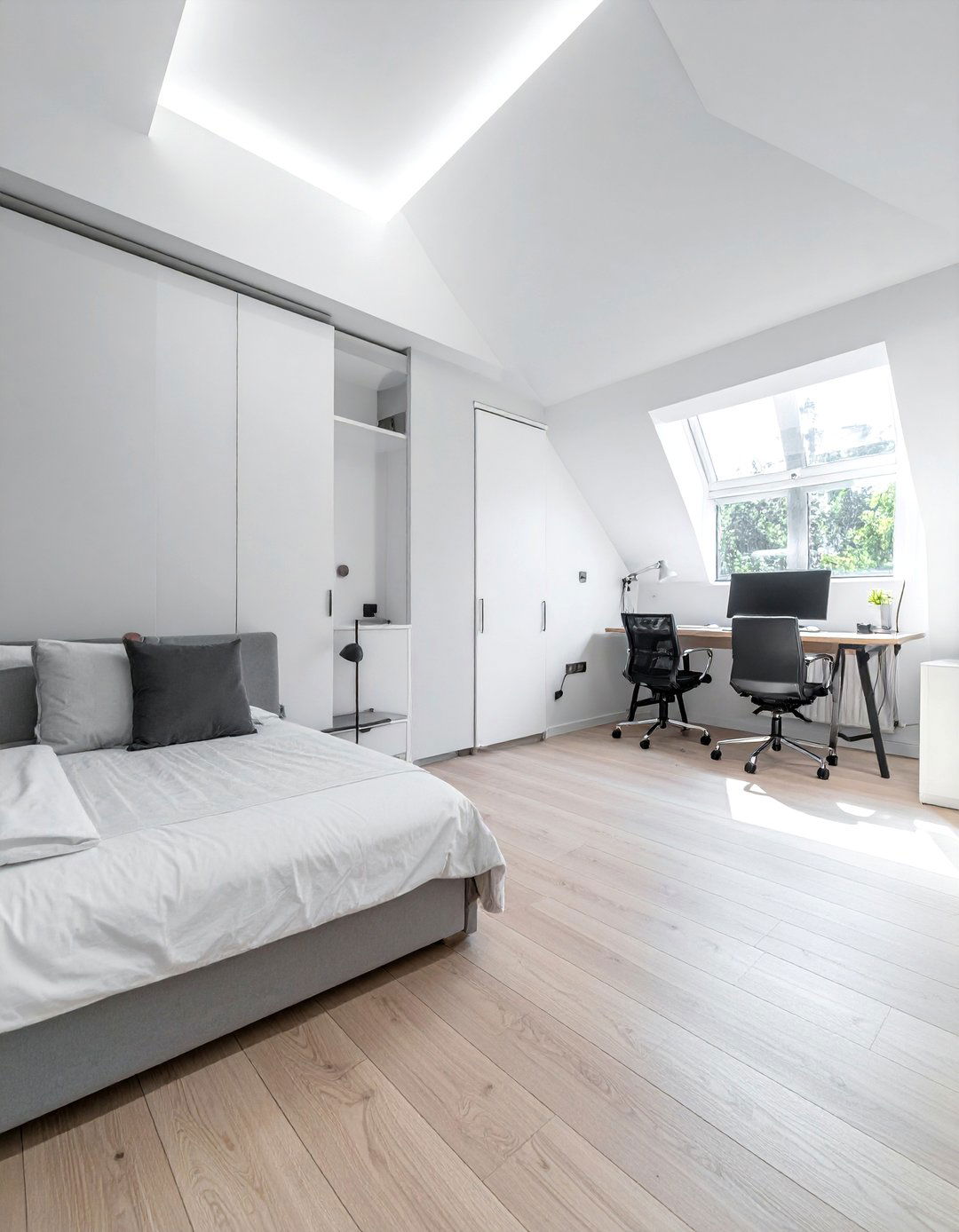
For an attic that needs to be truly multi-functional, a Murphy bed is an ingenious solution. This type of bed folds up into a cabinet against the wall when not in use, freeing up the entire floor area for other activities. By day, the attic can be a home office, a playroom, or a workout space. By night, it can instantly transform into a comfortable guest bedroom. Many modern Murphy bed systems include integrated shelving or a fold-down desk, further enhancing their space-saving capabilities. This makes it possible to get maximum utility from a very small footprint.
28. Glass Balustrade for an Open Feel
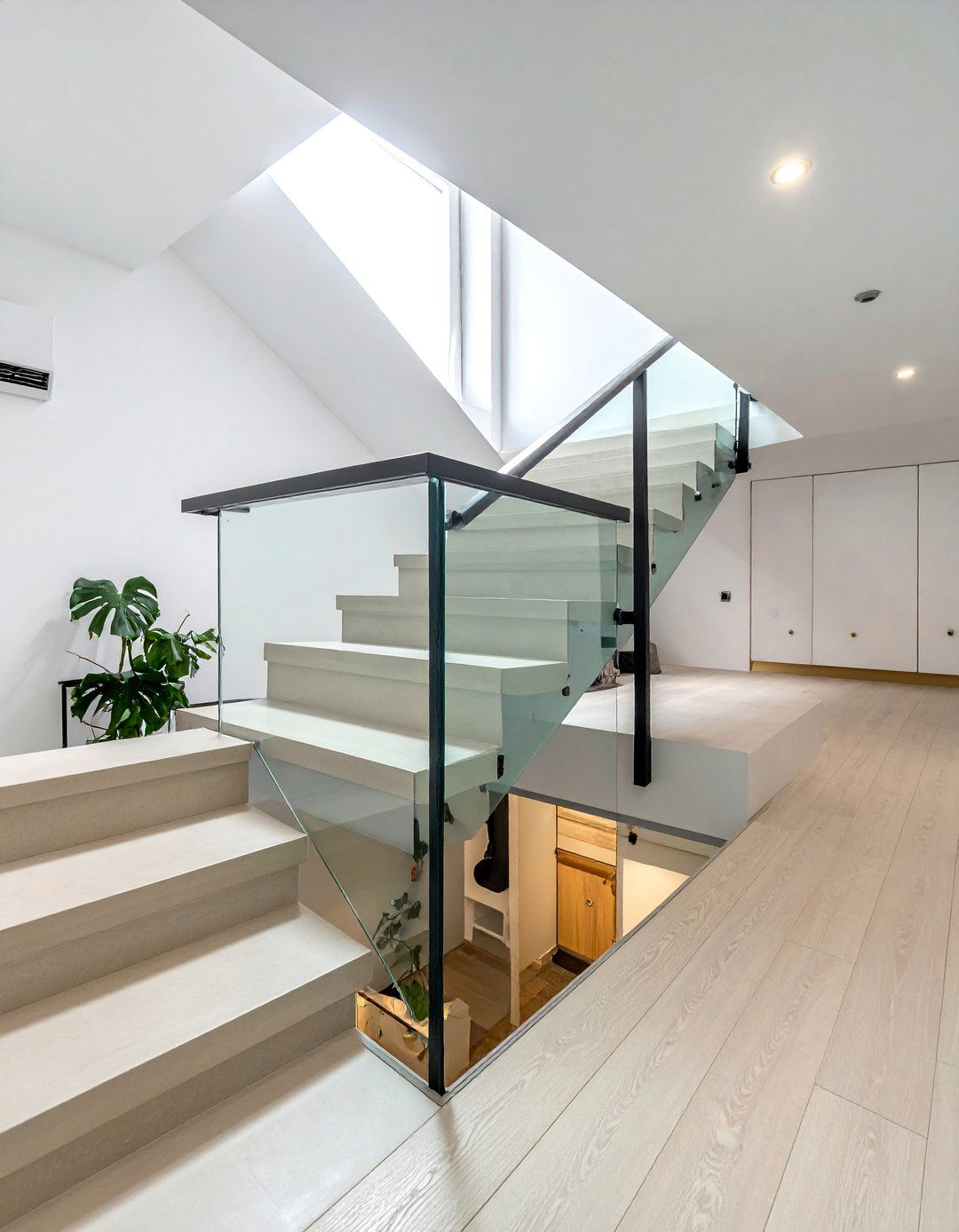
If your attic is part of a loft-style conversion with a staircase opening, replacing a solid wall or traditional railing with a glass balustrade can dramatically enhance the sense of space. A clear glass barrier provides necessary safety without visually obstructing the room. It allows light to flow freely between the attic and the level below, making both areas feel more connected and open. This sleek, modern feature helps to minimize the enclosed feeling that can come with attic rooms, creating a clean, unobtrusive look that works well with any decor style and makes the entire space feel larger.
29. Monochromatic Color Scheme with an Accent Wall
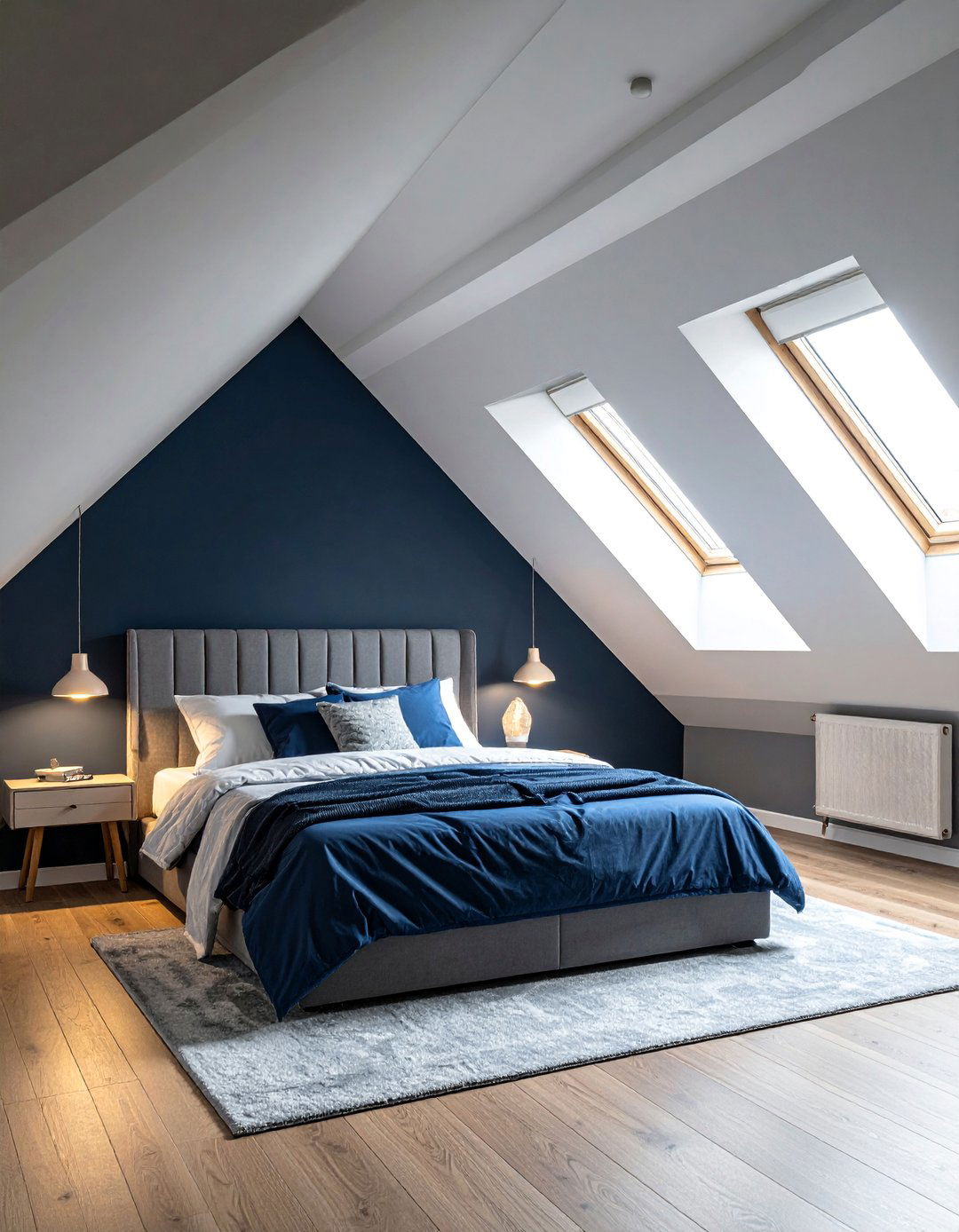
A monochromatic color scheme, using varying tones of a single color like gray or blue, can create a sophisticated and cohesive look in a small attic. This approach simplifies the visual landscape, making the room feel less cluttered. To add depth and a point of interest, introduce a single accent wall. You could use a darker shade of the main color, a bold complementary color, or a subtle wallpaper pattern on the wall behind the bed or desk. This technique draws the eye, adds personality, and creates a focal point without overwhelming the small space, providing balance and style.
30. A Cozy Attic Library with Low Shelving
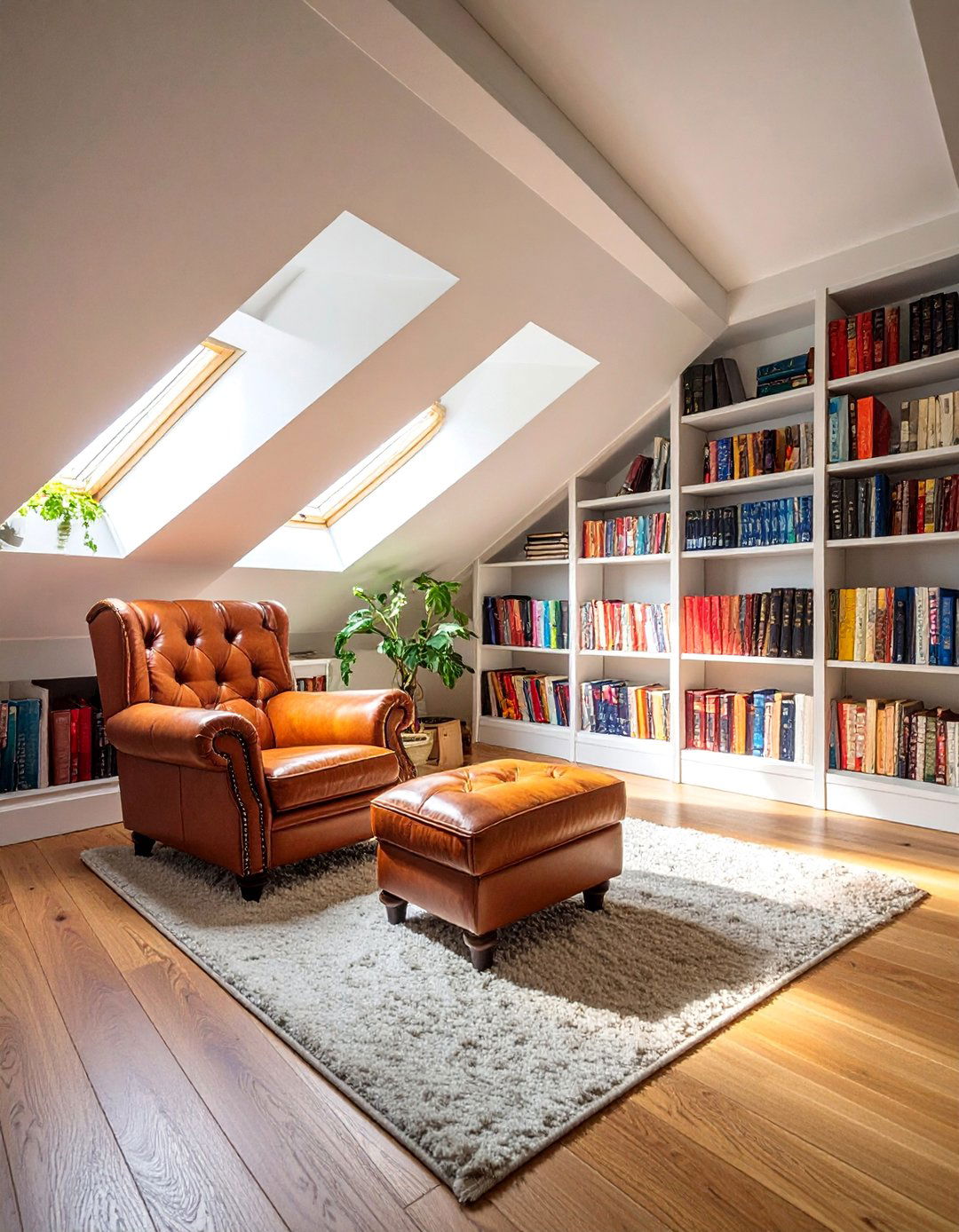
Create a book lover's dream by turning your attic into a cozy home library. Utilize the low knee walls by installing long rows of low-profile bookshelves. This keeps the books accessible and organized without encroaching on the limited vertical space. Place a comfortable armchair or a small loveseat in the room, along with a good reading lamp and a small side table. The intimate scale of an attic, combined with the warmth and texture of books, creates an incredibly inviting and intellectual atmosphere. It becomes a perfect, quiet hideaway for reading and reflection, surrounded by your favorite stories.
Conclusion:
Ultimately, a low-ceiling small attic room offers a unique canvas for creativity. The key to success is to work with the room's inherent characteristics rather than against them. By implementing smart design choices such as light color palettes, low-profile furniture, and multi-functional pieces, you can maximize both space and comfort. Strategic lighting and clever storage solutions are essential in transforming these challenging spaces into cozy, functional, and charming retreats. Whether it becomes a bedroom, office, or lounge, a well-designed attic can be a valuable and beloved addition to any home.

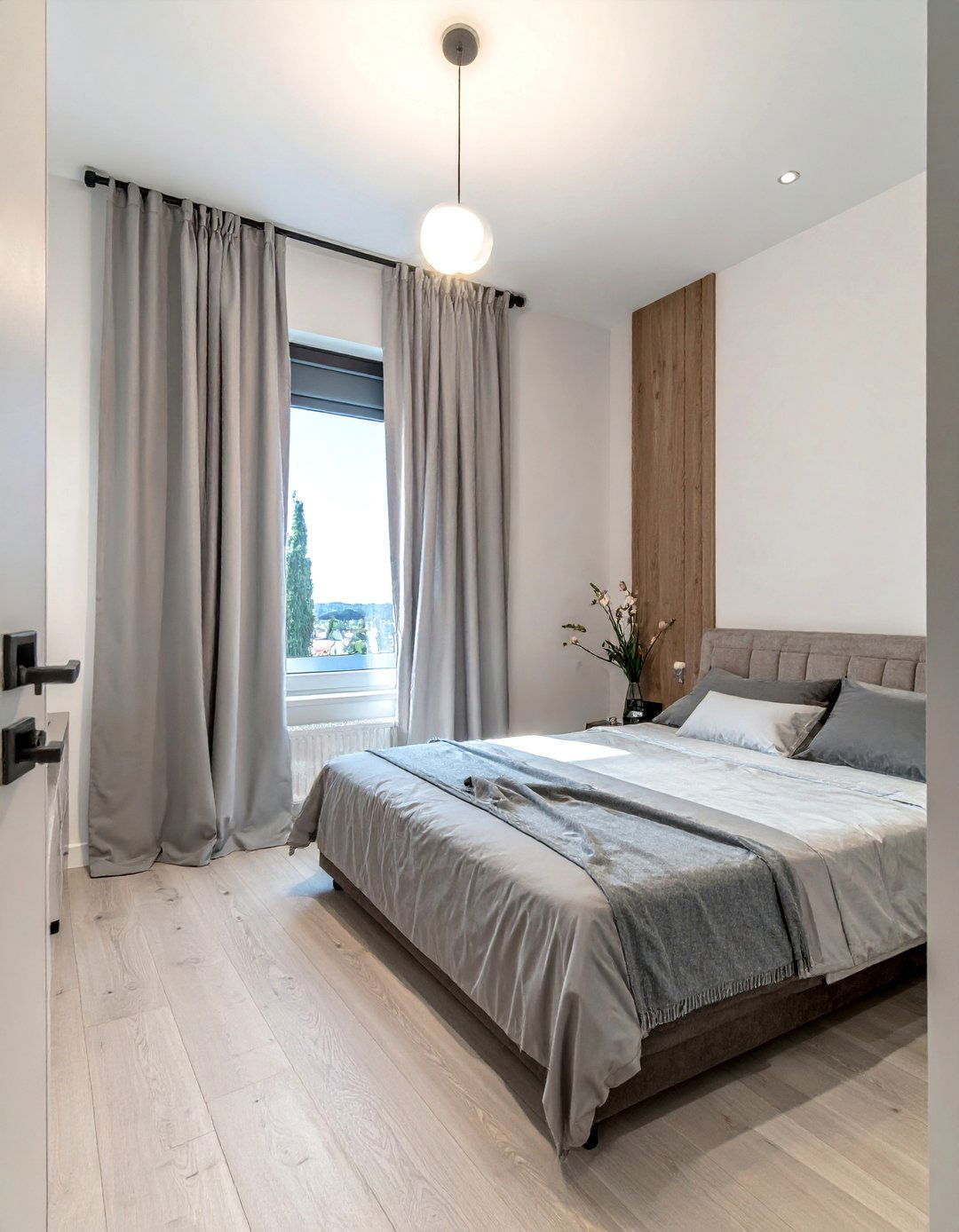
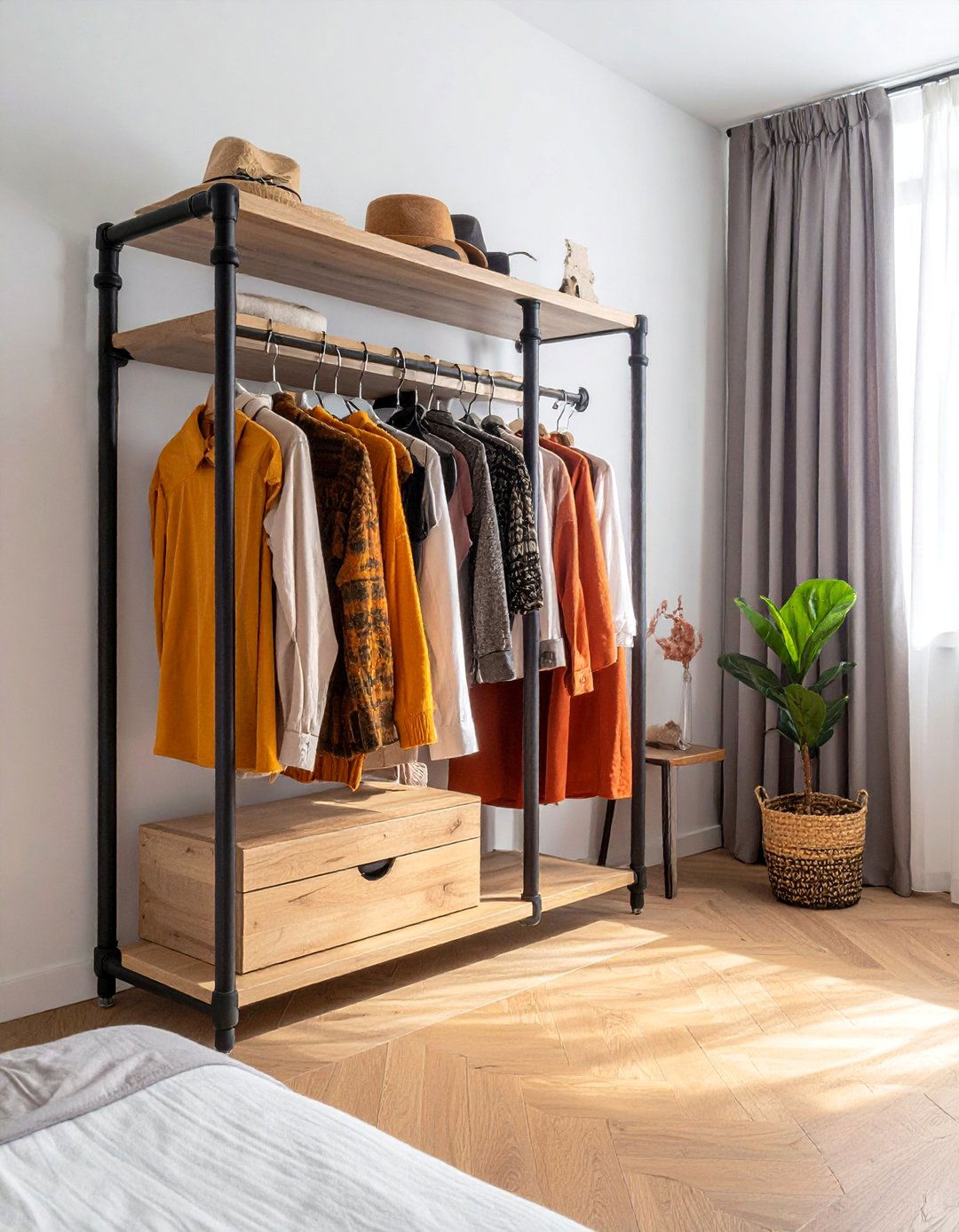
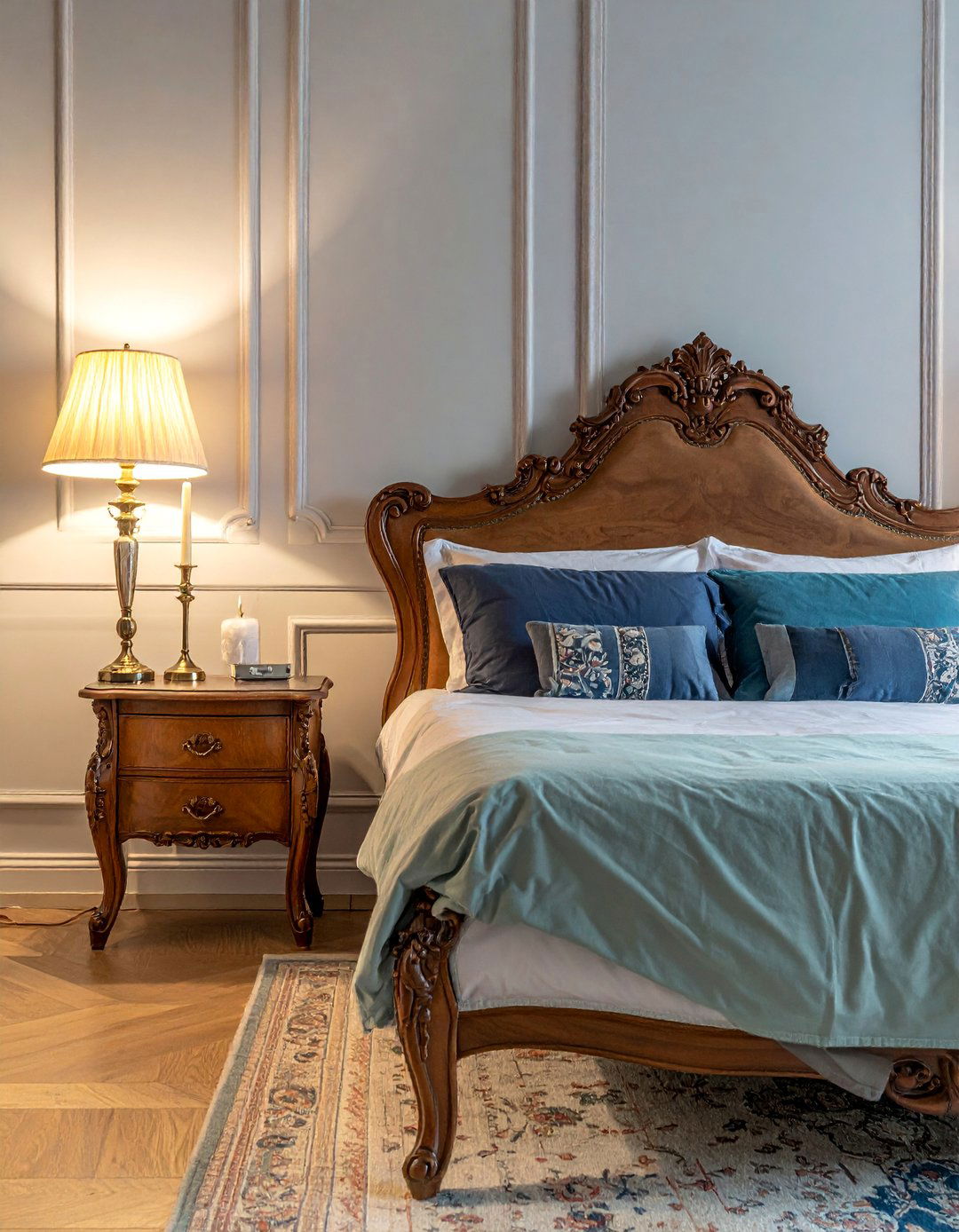
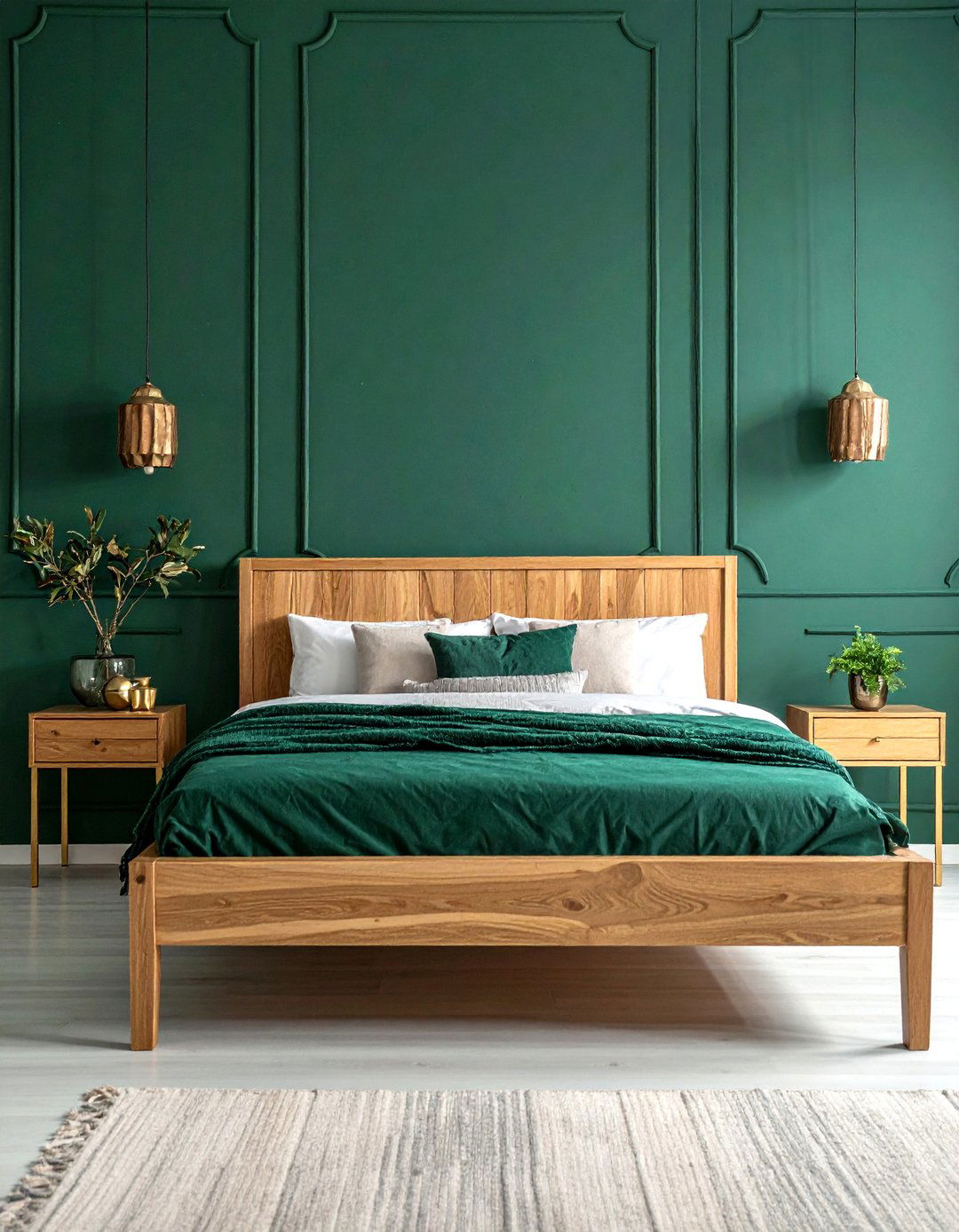
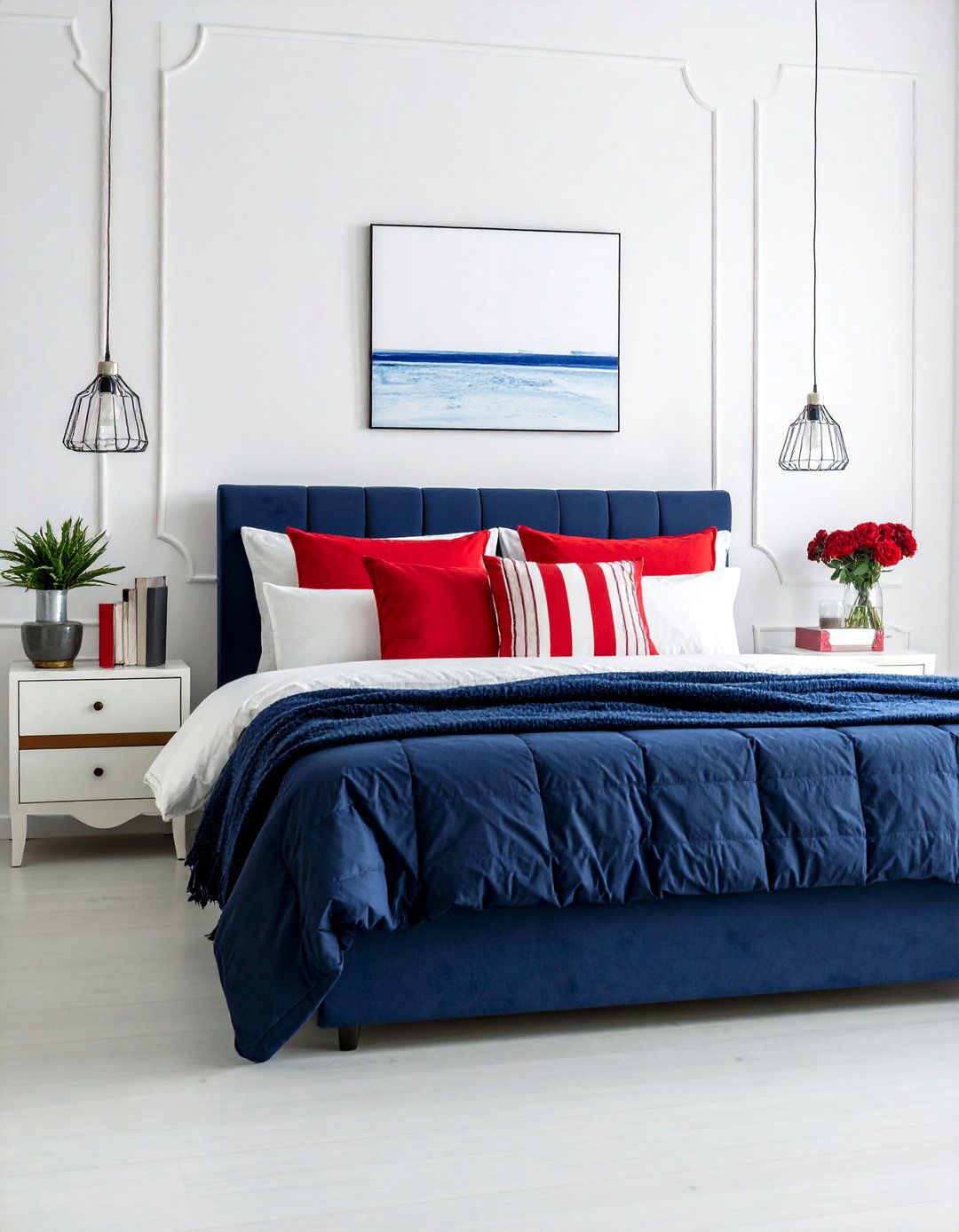
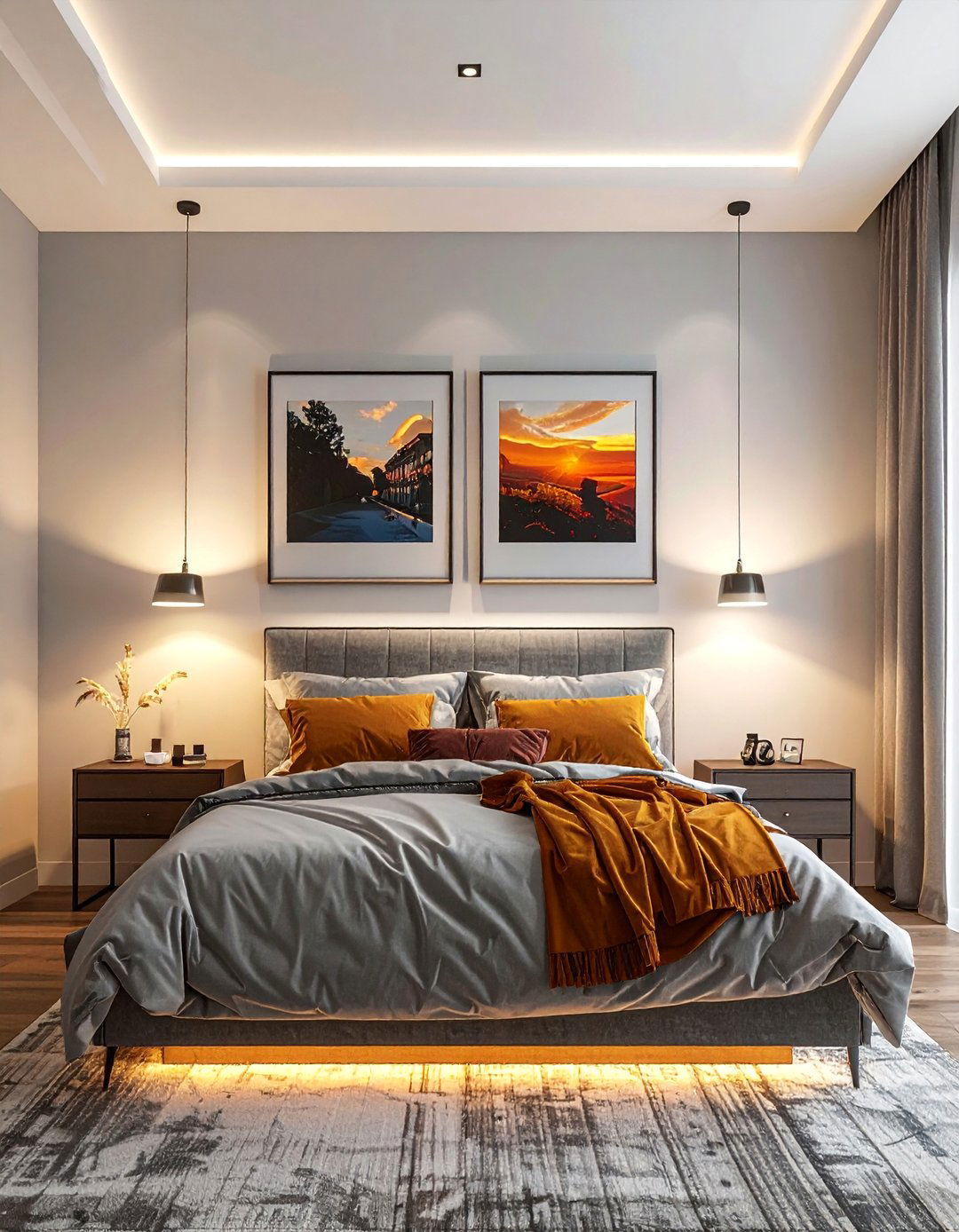

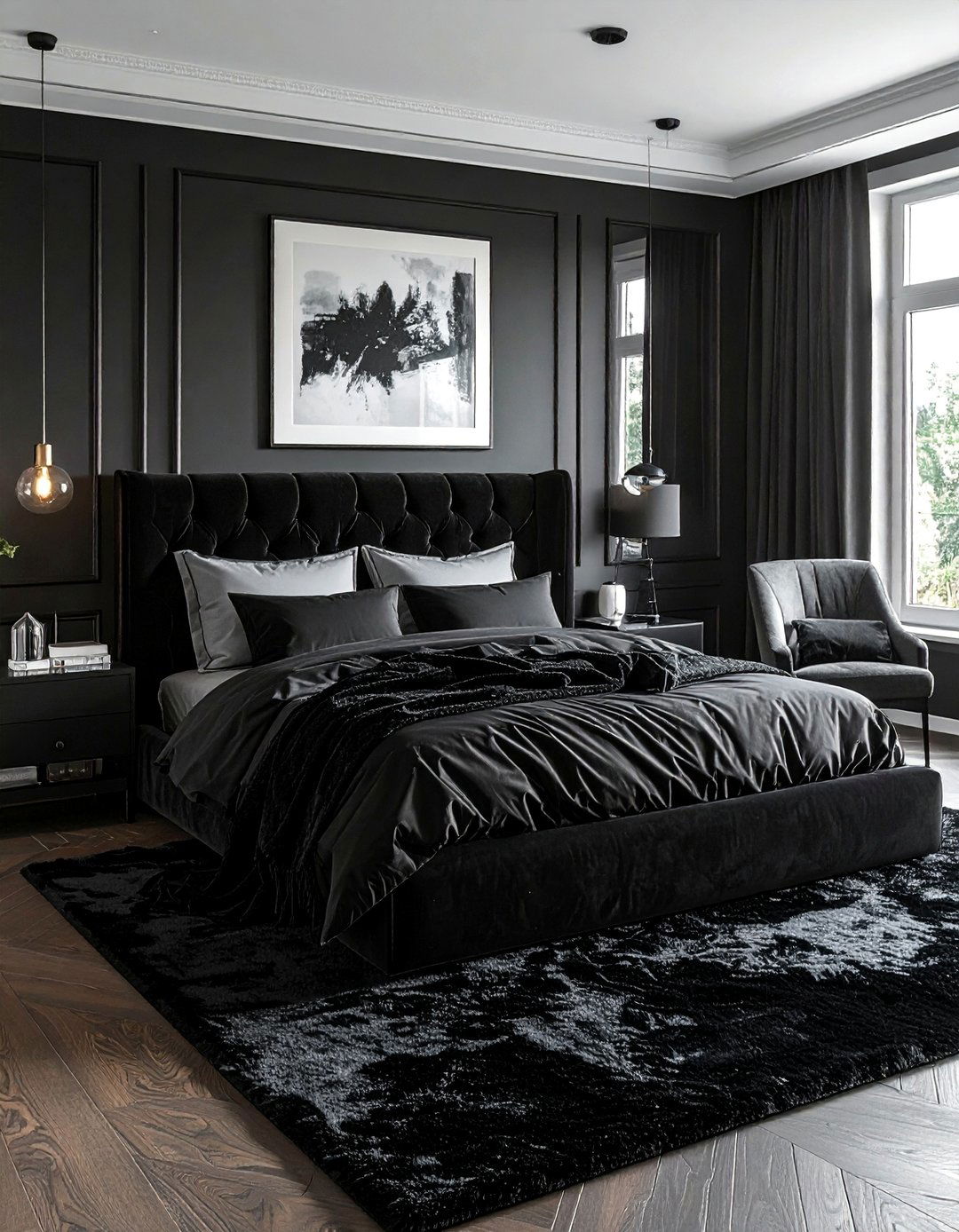
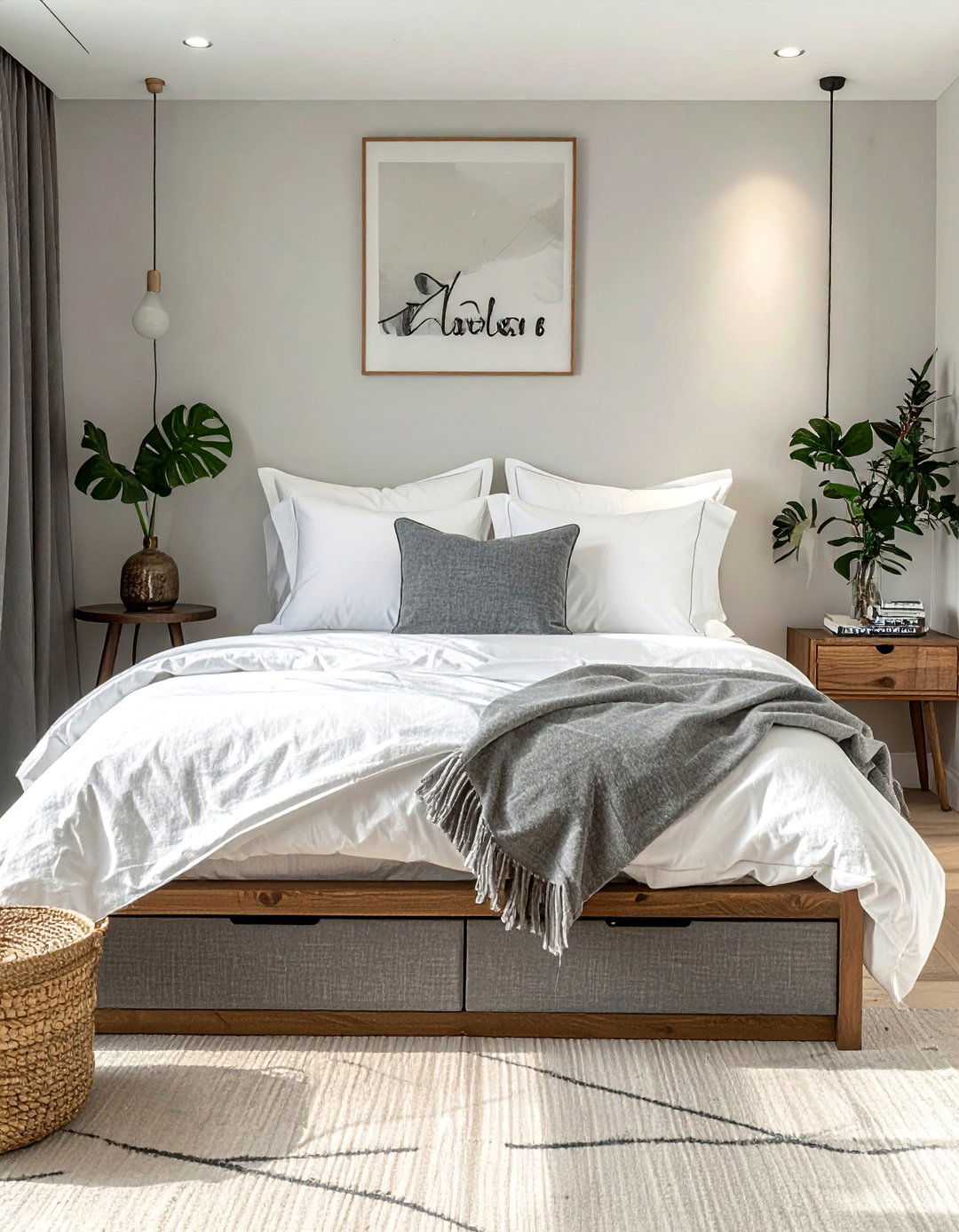
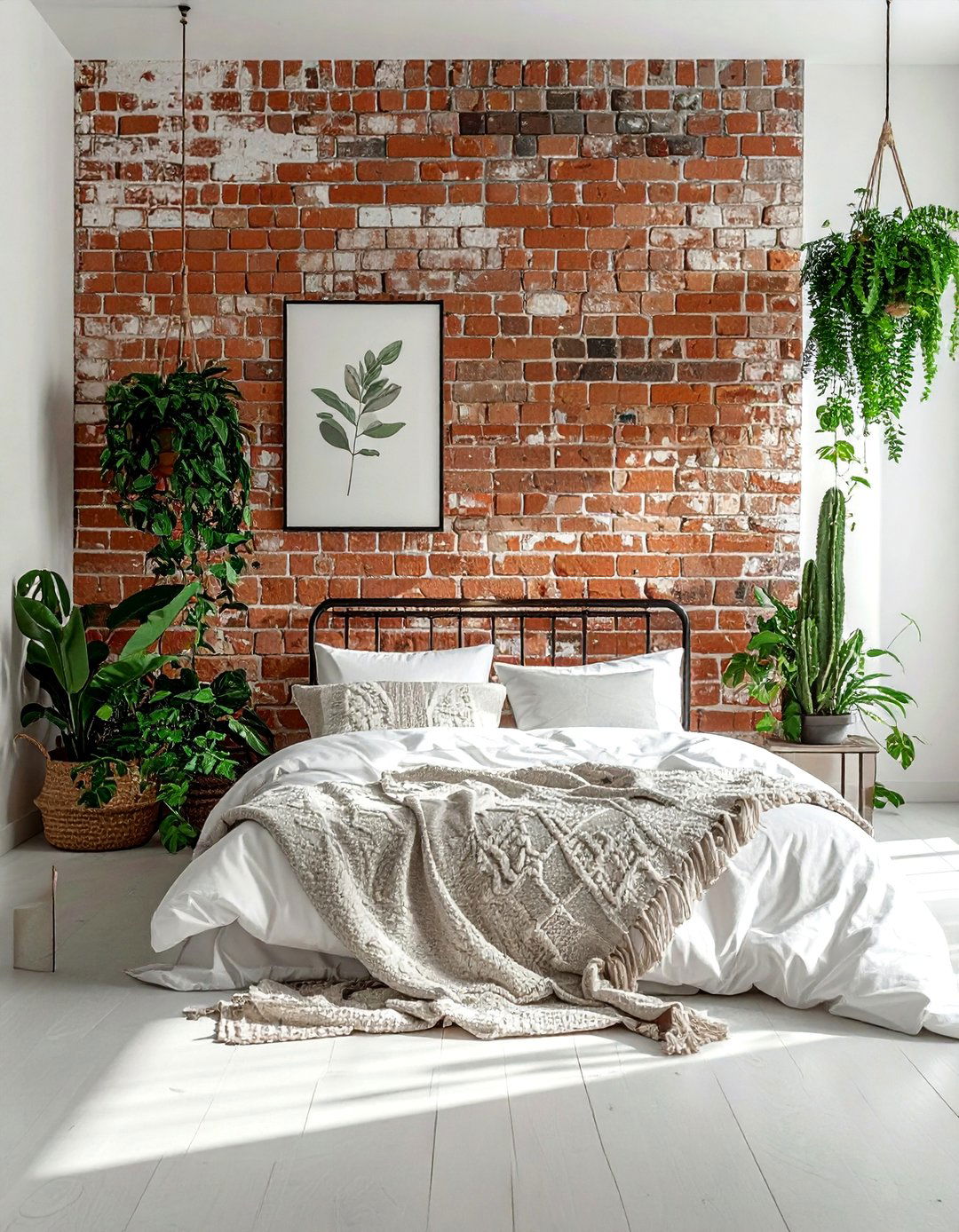
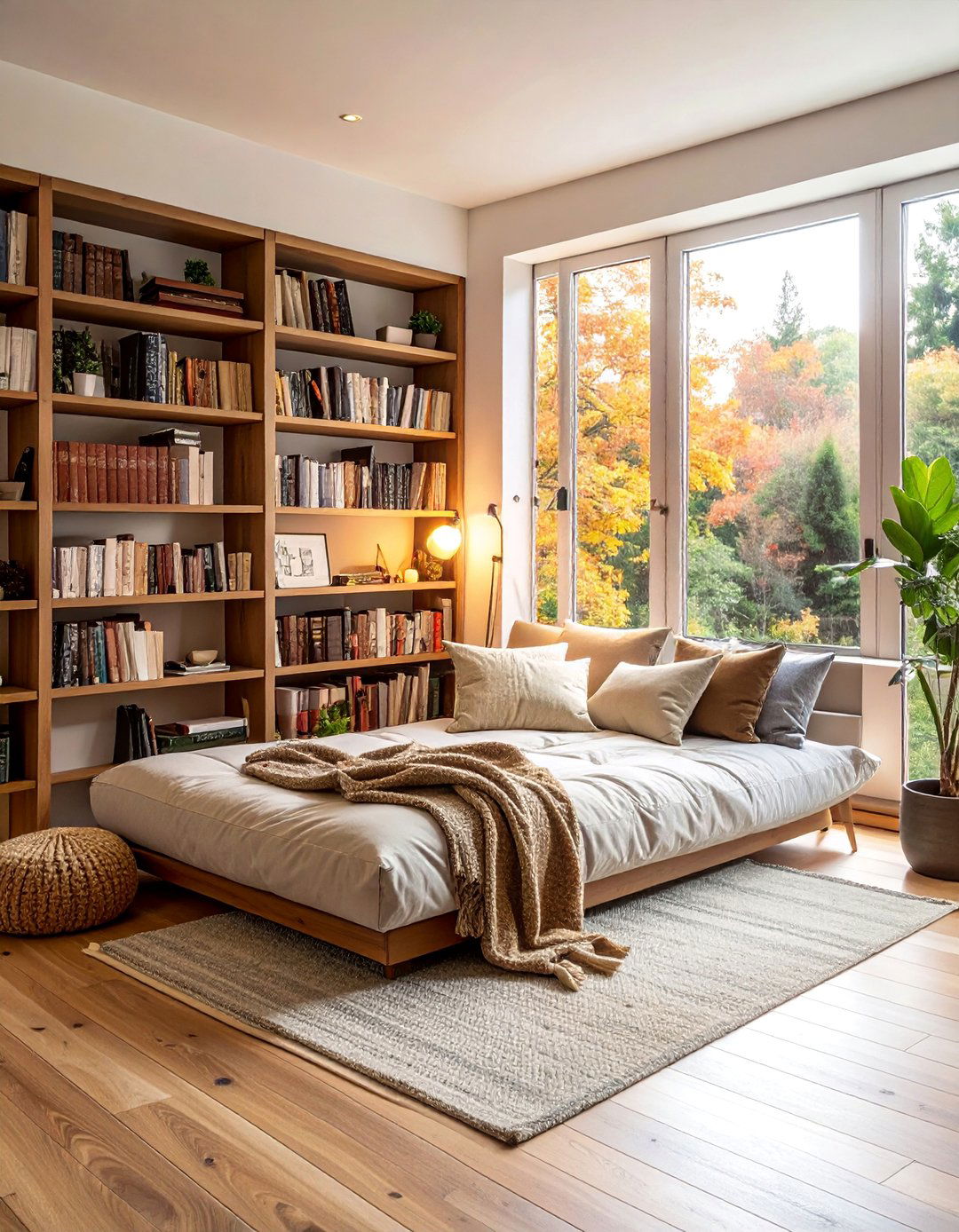
Leave a Reply